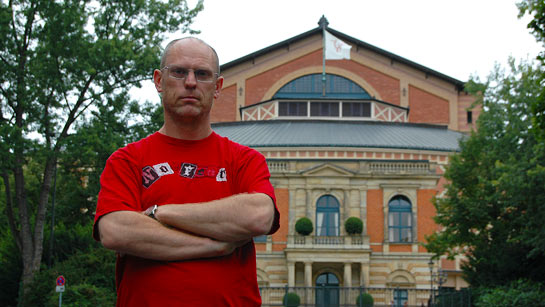"My Bayreuth Experience"
Travel letters and stories from Bayreuth Festival attendees.
Colin Bayliss • Clemens Bieber • Bea and Alec Bobotek • Stephen Charitan • Gary Campbell • Jerry Floyd • Sam Goodyear • Janette Griffiths • Diana Herbst • Hildegaard Arnold Kiel • Randall G. Malmstrom • Anne Midgette • Walter Meyer • Wouter de Moor • John F. Runciman • Per-Erik Skramstad • Brian Slater • Julia Thornton • Natalie Tsang • Mark Twain •
A Bayreuth Experience
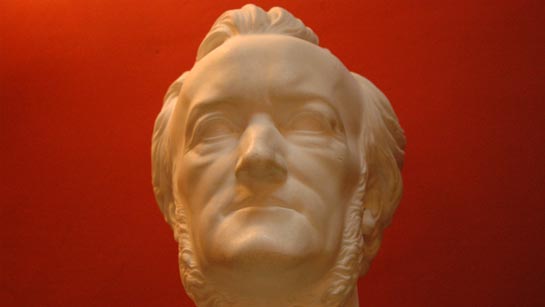
Richard Wagner in Haus Wahnfried. Photo: Per-Erik Skramstad
At last, at last! After nine years of applying for tickets, my wife and I obtained tickets for Parsifal and Meistersinger at Bayreuth in 2007. I was then approaching sixty and, being a composer myself, I didn't want to die before I had heard Parsifal in the acoustic for which it was written! Although Wagner's music has never influenced my own compositions, I consider him the most profoundly moving of composers, and my collection of Wagneriana runs into hundreds of books, articles, scores, CDs of all the operas, and so on.
We determined to make the experience into something special, as indeed it should be. Therefore we flew to Cologne and traveled to Nuremberg by train down the Rhine valley. We then spent a couple of days in Nuremberg taking in the atmosphere of Hans Sachs' city.
Then to Bayreuth itself! Alighting from the train, the first thing one sees is the Festspielhaus rearing out of the trees half a mile away, which is the first of many times your breath is taken away.
Our hotel was halfway between the station and Wahnfried, so after unpacking the bags, it was straight to the Wagner museum there. A small admission charge and we were in Wagner's own house with all its fascinating memorabilia. As I walked through the Saal past his library of philosophical books I burst into tears without warning. The attendant told my wife that this happens frequently.
In the evening we walked up to the Festspielhaus and talked to members of the chorus who were not singing that night. I found that my German was far better than I had thought and I could converse about other things than rings and grails!
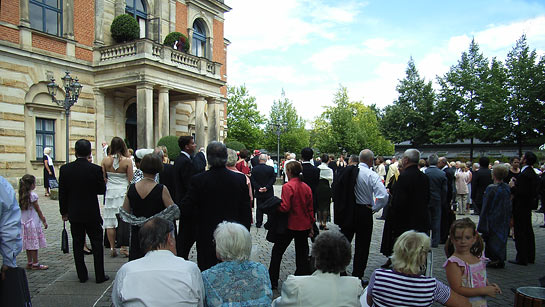
Bayreuth Festival. Photo: Per-Erik Skramstad
The next day was Parsifal, and to enter the Festspielhaus at last was another breathtaking experience in itself. It was 80 degrees Fahrenheit inside but 90 outside, so it seemed quite comfortable! The wooden seats are also surprisingly comfortable as they support the thighs even for someone of my height of six foot three. The unique sound from the covered pit cannot be described except to say that the music seemed to be both around and within your head. It was the last of the old production of Parsifal (Christoph Schlingensief) and although the singing and conducting were near perfect, the replacement of that production can only be welcomed. So too will the replacement of Katharina Wagner's production of Meistersinger! I have no objection to the modernistic avant garde productions, but they must be done well, and this production was so misguided in concept and overburdened with so much irrelevant stage business that both the singers and the orchestra were affected. However, it did give us the opportunity to hear that wonderful acoustic in action when 1800 people booed!
![]()
Katharina Wagner's production of Die Meistersinger von Nürnberg: Hans Sachs is kidnapped by performance artists in Act 3. Photo from 2009: Enrico Nawrath
It would be irrelevant to the Wagner theme to go into detail of the rest of our time there, but I must mention going to hear German organ recitals on instruments which are kept in immaculate tuning, unlike English ones. Also we went to a recital of English church music in Bayreuth and met someone whom I'd not seen for 15 years; then in Cologne on the way home we had dinner with a player in the Gurzenich Orchestra who surprised me by showing me a video of his conducting a piece of my music with a youth orchestra in Italy.
But back to Wagner. Let me quote Gustav Mahler. "Emerging speechless from the Festspielhaus [after hearing Parsifal in 1883], I realised that I had undergone the most soul-wrenching experience in my life, and that I would carry this experience with me for the rest of my days". It would be difficult to express the Bayreuth experience better except to say that it has been with me consciously every day since August 2007.
Colin Bayliss • Clemens Bieber • Bea and Alec Bobotek • Stephen Charitan • Gary Campbell • Jerry Floyd • Sam Goodyear • Janette Griffiths • Diana Herbst • Hildegaard Arnold Kiel • Randall G. Malmstrom • Anne Midgette • Walter Meyer • Wouter de Moor • John F. Runciman • Per-Erik Skramstad • Brian Slater • Julia Thornton • Natalie Tsang • Mark Twain •
Tenor Clemens Bieber on Bayreuth
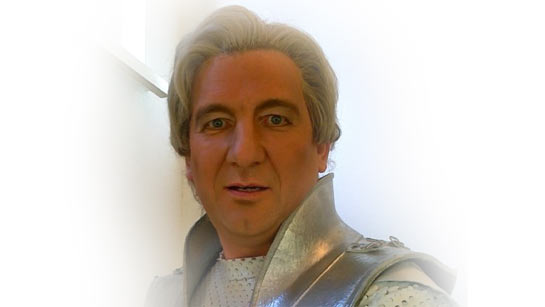
(Interview with Mainpost.de: Clemens Bieber: Ein Würzburger für Wagner)
Seit 1987 treten Sie bei den Bayreuther Festspielen auf.
Bieber: Von 1996 bis 2000 habe ich pausiert. Seit 2001 bin ich wieder dabei. Dieses Jahr sind es also 20 Jahre. Ich bin inzwischen der dienstälteste aktive Solist in Bayreuth.
Hat Bayreuth für Sie etwas Besonderes?Bieber: Es hat eine besondere Atmosphäre. In der langen Zeit, die ich dort verbracht habe, habe ich so viele interessante Leute kennengelernt, habe so gute Produktionen mitmachen können. Man hat tolle Dirigenten, man hat sehr gute Regisseure. Die Voraussetzungen sind einfach optimal. Es macht mir eine Riesenfreude, dort zu arbeiten.
Sind Sie in Bayreuth nervöser als sonst?Bieber: Man ist immer nervös. Es relativiert sich aber.
Ich habe den Eindruck, das Publikum in Bayreuth sei kritischer als anderswo und auch besser informiert. Sie haben den Vergleich, etwa mit der New Yorker Met. Wie sehen Sie's?Bieber: Das Bayreuther Publikum ist wissender, erfahrener und oft auch sehr viel kritischer als anderswo. Wobei in Bayreuth manchmal Maßstäbe angelegt werden, die kaum zu erfüllen sind. Ich sage immer: Leute, bedenkt, dass es eine Live-Vorstellung ist! Das heißt, es kann was passieren – technisch, sängerisch, was auch immer. Auch mit der besten Vorbereitung und mit den besten Voraussetzungen: Wir sind alle nur Menschen. Wir versuchen unser Bestes zu geben. Aber es gibt keine Garantie.
Hat man vor dem Bayreuther Publikum als Sänger vielleicht sogar Angst?Bieber: Mit Angst darf man nicht auf die Bühne gehen. Wer Angst hat, ist verkrampft. Und das ist fürs Singen gar nicht gut. Man muss Respekt vor dem Publikum haben. Ich habe bisher noch keine schlechten Erfahrungen mit dem Bayreuther Publikum gemacht.
Read the whole interview in Mainpost.de
Clemens Bieber in Bayreuth
(notes on Deutsche Oper Berlin's Facebook Page)
1.
"Wie so oft in Bayreuth: es regnet und es ist kalt, aber wir beginnen mit den Proben, Tannhäuser schon eine Woche und Tristan und Isolde seit Montag. Viele Kollegen sind schon hier, auch die Deutsche Oper Berlin ist gut vertreten auf und hinter der Bühne und es freut einen immer wieder, alle Kollegen zur Festspielzeit wiederzusehen. Der Chor beginnt auch diese Tage und allmählich füllt sich der Hügel!"
2.
Stefan Herheim ist da und wir proben seit Mittwoch PARSIFAL! Diese Produktion macht soviel Freude, dass sogar die Proben wie im Fluge vergehen ( was nicht immer ist!!). Es geht entspannt und doch sehr konzentriert zur Sache und wir freuen uns auf unseren neuen Parsifal Simon O'Neill, der in der neuen Spielzeit auch wieder an der Deutschen Oper Berlin gastieren wird (im Trovatore). Allmählich sind alle eingetroffen, nur das Orchester fehlt noch, was die hiesige Gastronomie natürlich mit schweren Umsatzverlusten ausbaden muss!! Aber bald sind ja unsere Orchesterfreunde da.
3.
Bayreuth im Hitzestau, es ist eine "Freude" bei über 30° in einer Industriehalle Parsifal zu probieren, man kann gar nicht soviel trinken wie man schwitzt. Aber nach viel Regen heute Nacht sind die Temperaturen wieder erträglich und jetzt sind auch alle da, das Orchester hat heute mit den Proben begonnen. Und nun geht es zügig voran, Orchesterproben und Bühnenproben lösen sich ab, mit Tristan beginnt es, für Parsifal stehen heute wichtige Bühnenproben an, vorallem die vorzügliche Bühnentechnik ist hier gefordert. Und dies muss ich auch mal erwähnen: was die Techniker gerade im Parsifal leisten ist unglaublich und bewundernswert, übrigens auch etliche Kollegen von der Deutschen Oper Berlin!!
Colin Bayliss • Clemens Bieber • Bea and Alec Bobotek • Stephen Charitan • Gary Campbell • Jerry Floyd • Sam Goodyear • Janette Griffiths • Diana Herbst • Hildegaard Arnold Kiel • Randall G. Malmstrom • Anne Midgette • Walter Meyer • Wouter de Moor • John F. Runciman • Per-Erik Skramstad • Brian Slater • Julia Thornton • Natalie Tsang • Mark Twain •
August Wagner – Bayreuth
We two, mother and son, made the pilgrimage to Bayreuth this year after attending Seattle's second 2009 Ring cycle. Bayreuth was this year just as Bea remembered it from 2002 – a beautiful little center of Wagner worship with the devout arranging their schedules around the four o’clock opera start time.
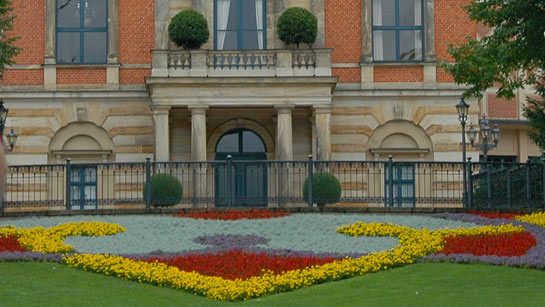
That unvarying fact dictated busy mornings of elaborate breakfasts, museum schedules, conversational exchanges about the performance of the night before or the current state of the festival management, as well as other temptations: the shops and the lectures, the latter sponsored by the New York Wagner Society, this year by Hans Rudolf Vaget, Professor Emeritus from Smith College (and editor of a journal of Wagner studies, among other things).
The Parsifal of August 27 was performed in a very warm Festspielhaus but turned out to be so riveting that somehow the oppressive heat hardly seemed to matter: remarkably, there were no audience casualties. The next evening brought considerably cooler temperatures but a less-than-memorable Tristan production. The net result, perhaps predictable: by the last act, the audience suffered casualties requiring semi-conscious members to be carried from their seats. How fortifying a fine Parsifal can be.
Parsifal
Our Parsifal was indeed very fine, but involved much extrapolation of the modern history of Germany and accompanying references to swastikas and the like. It also featured the first childbirth scene (of Kundry) that we remember seeing in a Parsifal. There were strong visual icons – bed with trap door in stage center, fireplace/hearth, and a clock that seemed to measure social progress rather than time. Its elaborate sets, costumes, technology (electric and pyrotechnic spears, visual projection), visual icons, and concurrent telling of a second story worked well, providing overall a most complex and rich opera experience of music, theatre, and story. There were zero boos and plenty of heartfelt bravos from the audience – despite earlier unease when the swastikas and stormtroopers made their appearance.
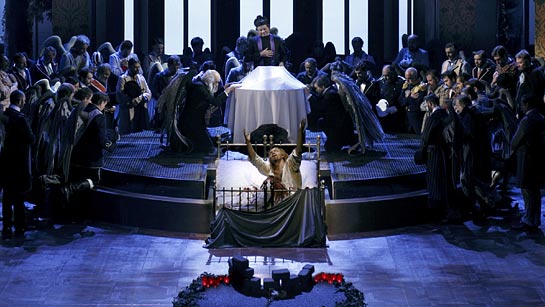
This production, introduced in 2008, is the work of Stefan Herheim who combined, as implied above, “various aspects of current European stage styles, psychological realism with symbolism and metaphor, between the text inferences, and influences of surrealism” (our translation of phrases from a German-language booklet on the production by Suzanne Vill). Included in the metaphoric staging were scenes not only of the progression of German history on film, but also visual references to Haus Wahnfried as the characters of Parsifal and Herzeleide were shown in childhood and in varying stages of growing up, particularly in the case of Parsifal. The first scene included a rocking horse.
One suspects the staging has strayed too far when one must rely on the director’s off-stage narratives to explain the progress of events. But all in all this was an involving, fascinatingly conceived production.
Tristan
By any measure, Tristan was a very flat performance. The production opened on a flat stage with two padded stools at stage front and two wooden and glass-enclosed booths next to each other at the back. Isolde and Brangäne sat on the stools huddled tightly next to each other, while Tristan and his envoy emerged and returned to their respective booths at their entrances. The potion drinking episode did provide a bit of drama, at least.
The final act had Tristan in a bed horizontally placed on the stage, with Isolde singing and expiring in the bed after having embraced the dead Tristan who by that time lay on a stretcher in front of the bed. There was some play of lights in the ceiling and on the walls of the theater, coarsely reflecting the day and the night.
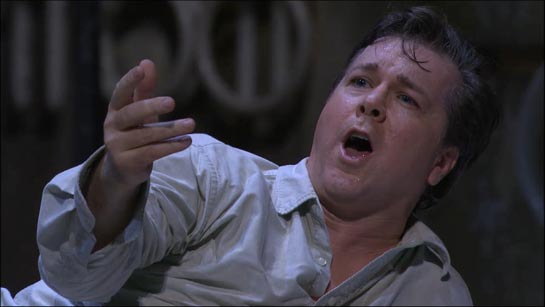
Since Tristan is really all about expression through musical means, we can report that Peter Schneider conducted the festival orchestra with relaxed aplomb even if somewhat perfunctorily at times, and that Tristan (Robert Dean Smith), King Marke (Robert Holl), Kurvenal (Jukka Rasilainen), and Brangäne (Michelle Breedt) were faithfully and artistically portrayed and with satisfyingly fresh vocal resources. Robert Dean Smith performed with considerable security, much as he had in the recent Met broadcast performance. On the other hand, the Isolde of Iréne Theorin was a major disappointment given the excitement built around her unexpected Met debut as Brünnhilde. The Swedish soprano sang shrilly at the top, and with surprisingly poor diction. So, all in all, thumbs down for this production.
Wahnfried
The day after the festival’s end, there was a quick exodus from the hotel, and many restaurants curtailed their hours of service, as did our hotel, the Arvena Kongress. But no problem, we had scheduled a visit to Wahnfried, which with its expansive proportions including an open air atrium and lavish possessions, artworks and furnishings belie the indebtedness of its original owner.
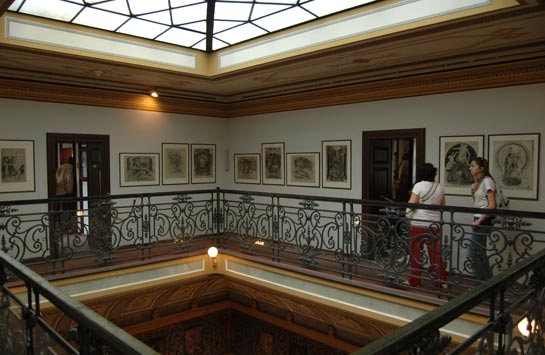
A high point of our visit was an unscheduled recital, for just three of us, by Hungarian pianist Jenö Jandó who, during our visit to the Liszt house and museum across the street from Wahnfried, had persuaded a delighted curator to allow him to play one of Liszt’s pianos (formerly used by Wagner while he was working on Parsifal).
Colin Bayliss • Clemens Bieber • Bea and Alec Bobotek • Stephen Charitan • Gary Campbell • Jerry Floyd • Sam Goodyear • Janette Griffiths • Diana Herbst • Hildegaard Arnold Kiel • Randall G. Malmstrom • Anne Midgette • Walter Meyer • Wouter de Moor • John F. Runciman • Per-Erik Skramstad • Brian Slater • Julia Thornton • Natalie Tsang • Mark Twain •
Bayreuth Festival 2011
REGIE RAGE: DIE MEISTERSINGER (Aug. 24, 2011) TANNHÄUSER (Aug. 25, 2011)
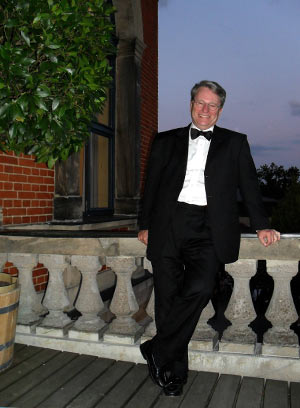
I had a wise history professor in college who would often say "in life you do what you can." His words came back to me when I was deciding to attend the 2011 Bayreuth Festival - a year that promised relentless regie, no Ring, and with a few exceptions, "B list" casting. As things worked out 2011 became possible and I thought I would follow my professor's advice. If all else came up a cropper, I could still rely on that magnificent acoustic, the superb orchestral playing, a grand chorus, and the magic of being in Wagner's own theatre. Things got off to a rocky start with Katarina's "upside down" Meistersinger, my second go at this shock schlock. Who would ever think to be discussing masturbation, defecation, and full frontal nudity in conjunction with a performance of Die Meistersinger, but all could be had for the price of a ticket. Worse than any of that nonsense however was the fact that not one character was directed to show any human emotion towards another - this in one of the most warmly human works in the repertory. Strangely enough, what kept this directorial Hesperus from being a total wreck was the singing. Though too young in both voice and appearance, James Rutherford sang Sachs with a rich, rolling baritone. He retained those qualities through to the end of a long evening. Norbert Ernst brought a strong, almost stentorian sound to David but still managed a fluid, cantiblie line. His was one of the finest musical interpretations of this role I've experienced, and fortunately the production couldn't find a way of working him into the concept so the character was more or less left alone. Michaela Kaune unfortunately played an Eva who was not beloved of any of the other characters, or more accurately, "concepts" passing for characters, but she sang "O Sachs, mein Freund" with passion and soared with purity though the quintet. The Walter was Stefan Vinke substituting for Burkhard Fritz. Vinke has a clear, ringing, not unpleasant sound that functions at two dynamic levels - loud and louder. Adrian Eröd brought a lean sounding comprimario’s voice to Beckmesser, but carried the bulk of the “concept” on his shoulders. Though it made no sense given the archaic sound Wagner created for Beckmesser’s music the conceit of the production was to turn this arch conservative into a non conforming revolutionary. Eröd did yeoman work in trying to consistently sell this character twist within the jumble of irrelevant stage business swirling around him. Sebastian Weigle's routine conducting couldn't compete with the shenanigans on stage, but the band played beautifully for him, as it did the remainder of the week. Next day's Tannhäuser trumped Meistersinger for offering a production which had virtually nothing in common with the details of the libretto at hand or the sound picture created by a German composer of the mid 19th century. The Venusburg was a cage that contained, in addition to a pregnant goddess, a variety of hairy, humping, humanoids, several outsized tadpoles, and one other creature of indeterminate species that looked like a cross between an ambulatory flounder and a turtle standing on two legs. I suppose this whole set up was some sort of metaphor for the baser animal instincts - nothing sensual or voluptuous about this Venusburg, including the Venus herself. Stephanie Friede gave what was arguably the worst vocal performance of the 5 opera set. When this mess sunk into the floor boards we were assaulted with Wartburg® - a waste recycling facility where at one point the “employees” were dumping excrement (tilted towards the audience so it was impossible to miss the point) into some sort of pressure vessel. This ghastly factory, filled with a robotic chorus was Tannhäuser’s alternative to the equally unappealing Venusburg which probably explains Elisabeth’s “assisted suicide” in the 3rd act. After Camilla Nylund delivered a beautifully poised prayer, momentarily eclipsing the dreck around her, she climbed the stairs surrounding a large circular tank followed by Wolfram who helped her into its steaming belly. Again making sure to club the audience over the head with shock value, Elisabeth tries to push her way out of the tank / gas chamber, but Wolfram shoves her back in and closes the door. Michael Nagy, a handsome young artist with a smooth, caressing voice and a lieder singers feel for nuanced phrasing goes on to address his hymn not to the Evening Star but instead to the pregnant Venus. Tannhäuser himself gets rather lost in all of these goings on. Swedish tenor Lars Cleveman had the requisite weight of voice and strength of technique to sing, not bark the role right through the Rome Narrative but what he lacked was an ability to connect with the character and his dilemma. He could hardly be held accountable since subtext and sub sub text were what concerned director Sebastian Baumgarten, not the inconsequential trials and tribulations of the title character. Conductor Thomas Hengelbrock has had some experience as an Early Music specialist. Possibly for that reason I was more aware of a certain “rum ti tum” quality in this early Wagner that I think more experienced conductors of this repertory know how to balance or smooth over with greater effectiveness. With the boos still echoing in my ears from these two performances, I was looking forward with some trepidation to what would come next – would Lohengrin, Parsifal, Tristan and Isolde rise above this relentless regie? Stay tuned for Part 2.
REGIE REDUCED: LOHENGRIN (Aug. 26, 2011)
Day 3 promised Lohengrin and his rats. After more than 30 years of opera going I’ve found one maxim to be generally true – A genuine star performer can usually trump his or her surroundings – marginalizing regie, compensating for inadequate colleagues, and though a particular challenge in Wagner, offsetting a routine conductor or orchestra.
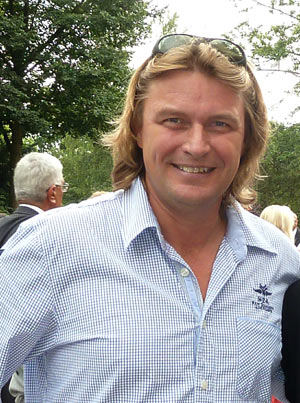
Over the past few years Bayreuth has been very lucky in capturing the commitment of one of these rare creatures – Klaus Florian Vogt. First off is a singularity of voice. Once heard it is impossible to mistake the clarion purity and almost choir boy cleanness of his sound for anyone else’s. He began his career as a horn player which might also account for the beauty and sensitivity of his phrasing. Add to this a handsome stage presence quite in keeping with the heroes of his current repertory. In short, the man “looks like” the voice. I’ve seen Lohengrin many times – this for me was the standard bearing performance of the title role. The audience at the August 25th performance awarded the leading man with a standing, stomping ovation.
Fortunately Bayreuth provided an appropriate setting for Mr. Vogt in terms of cast and conductor. Annette Dasch is a vivid actress with what could be described as “Bette Davis eyes.” I imagine she effectively registered to the back of the house without implying there was anything of the caricature about her Elsa. Vocally she lacked the ethereal float to make “Euch Luften” and the tender sections of the bridal scene the time stopping moments they can be but her strong, clear sound and urgent delivery brought the determined obsessiveness of the character front and center. Petra Lang was diminutive in stature but supersized in voice as Ortrud. She was a delicious fairy tale witch from top to bottom though I suppose a lack of subtlety might be argued. One of the memorable visuals in this production was to see Elsa and Ortrud in their big feathered ball gowns maneuvering around each other like white swan vs black. Tómas Tómasson, Georg Zeppenfeld, and particularly Samuel Youn as Telramund, Heinrich, and the Herald respectively all offered noble support. Andris Nelsons conducting was the most dramatically compelling of the 5 performance set.
I leave the regie til last because it had the least to do with the success of this performance. On the credit side were many striking visuals in terms of simplicity of image, and use of brilliant color. The staged prelude boded well. In it Lohengrin is seen pushing back a stark white wall as if this archetypal outsider somehow wanted to get in. Did he want in to rescue and reform or did he want in to conform and be accepted? Unfortunately, as with the Tannhäuser travesty the plight of the main character is saddled with an artificially inflated subtext that leads me to the rats. Unlike the choruses in for example, Boris Godunov, Khovanschina, Aida, and Turandot where they play a real role in the unfolding of the drama, the chorus in Lohengrin is largely there to comment on the action, not drive it. Here by dressing them as rats, sometimes white, sometimes black, and pink for the babies (twee comes to mind…), they immediately signal in large semaphoric gestures that they are bearing “the director’s message.” The rats are obviously in some sort of laboratory setting and first they seem to respond to the Hearld who is acting as a sort of proxy for, or is it more of a Martin Bormann / Dr. Morrell type to, a demented and confused Heinrich. Later on they switch their allegiance to Lohengrin – wearing uniforms with a capital “L” on their belts long before he reveals his name and heritage. Is it all about fascism (again…) and who is controlling the people / rats – Lohengrin, Heinrich, or - why not - even the Herald ? Perhaps they should graft on the Steersman or Mary from Dutchman just to mix it up a bit more? Thanks to the transcendence of Wagner’s music, the glorious vocalism of Klaus Florian Vogt and an accomplished cast and conductor I think the rats and their message became largely irrelevant.
REGIE REDEEMED: PARSIFAL (Aug. 27, 2011)
If you've followed me up to this point you might think I was violently opposed to "Regie" of any kind. That is not the case because Bayreuth's "Parsifal" courtesy of Stefan Herheim represents "Regie in excelsis." Maybe libretto and "concept" are not completely in sync in terms of minute details, but as to the bigger themes there is a tangible and direct connection that truly ignites the relationship between the music, the libretto, and the director's point of view. From a production standpoint, "Parsifal" was the pinnacle the 5 opera run - and adding to the triumph, the music making was nearly on as high a level. Herheim's concept is to equate the birth of Germany as a unified nation (1871) with Wagner's composition of Parsifal (music begun in 1877 - libretto 1857). The firm underpinning that brings these two milestones into confluence is the fact that both the country and the character are on a journey. Despite the degradation and shame each protagonist accumulates on that journey, the outcome is ultimately survival, reconciliation, and even progress through lessons learned. I saw this production in '09 and was so completely taken by its cumulative impact that I was blind to what I now see as an excess of ideas in Act 1. As if in an expressionistic dream, the prelude starts with a dying Herzeleide trying in vain to reach out to Boy Parsifal in Villa Wahnfried. As the act proceeds, this is mixed up with images of the Wittelsbach monarchy (both Amfortas and Boy Parsifal wrapped in the iconic blue ermine trimmed coronation robes of the dynasty) , intimations of an Oedipal relationship between the hero and his mother, and finally a mute Klingsor dramatically appearing out of a picture above a Wahnfried fireplace as a harbinger of a sensual corruption that would reach its apogee in a Weimar inspired Act 2. By the end of the first act depicting soldiers of WWI vintage gathered outside of Wahnfried, through the unfurling of Nazi swastikas, and the destruction of Wahnfried at the end of Act 2 the production gains a force, focus and momentum that never wavers until the breathtaking finale in the modern Bundestag that ends Act 3. Quite frankly experiencing the brilliance of Herhiem's "thought through" vision for Parsifal only emphasized the amateur, sensationalistic, and all too facile efforts of K. Wagner, S. Baumgarten, and H. Neuenfels for Meistersinger, Tannhäuser, and Lohengrin respectively. Of the 5 productions of this year's set, only this Parsifal would be worthy of Wagner's dictum: "Kinder, schafft Neues!" As to the musical performance, Simon O'Neill as Parsifal had something of the clear, focused sound that Klaus Florian Vogt brought to Lohengrin but unlike Mr. Vogt, the "nap" was gone and the voice lacked the spin of youth. Susan Maclean, though listed as a mezzo, brought a bright voiced soprano like timbre to Kundry. She was an intense, committed actress and made the most both vocally and dramatically of her big moments in Act 2. I would welcome the opportunity to hear her in this role again. The vocal standout of the 2011 Parsifal was Kwangchul Youn as Gurnemanz, just as he was in2009. The smoothness of his voice and the fluidity of his phrasing makes you appreciate why Wagner valued an Italianate / cantabile sensibility for singers of his operas. Would he have the same effect in one of the Big Barns typical in the U.S? In the Bayreuth acoustic as well as the greater world outside The MET such questions hardly matter. Thomas Jesatko as Klingsor channelling Marlene Dietrich can be as proud of his "gams" in a garter belt as he can be of his vocalism. Detlef Roth was a dry voiced, but dramatically effective Amfortas. It is so easy to become spoiled by luxury casting in this role remembering George London or more recently Thomas Hampson. Finally tying all together for the most successful totality of the 2011 run was the leadership of Daniele Gatti in the pit.
REGIE RECONCILED: TRISTAN UND ISOLDE (Aug. 28, 2011)
If my perception of the Bayreuth / Stefan Herheim “Parsifal” was “Regie Redeemed” than my second viewing of the Christoph Marthaler “Tristan und Isolde” might be called “Regie Reconciled.”
When I first saw this Tristan in 2009 it reminded me of something that might have been designed in the former DDR and outfitted from IKEA seconds. With its peeling wallpaper and dirty furnishings it still remains one of the most physically ugly settings I’ve seen vomited up on any stage. Three things however made this year’s experience significantly different and much more satisfying than ’09’s:
- Visually I knew what I was in for, so there was no shock or surprise element when the curtain went up. I approached the work as if I were going to a concert. Assuming a great musical performance Tristan und Isolde is one opera where stage setting can be immaterial because so much of the "action" is internal.
- My friend and I were sitting in row 7. From there it was much easier to focus on the expressions and body language of the individual singers without having to take in the whole bloody mess that I was forced to deal with when sitting further back. Because of their proximity, the singers themselves became the mise-en-scène.
- Most important of all, the eponymous characters were both on fire for what was the last performance of this season.
This “Tristan und Isolde” brought home to me once again the obvious fact that singers carry their instruments in their bodies. They are therefore subject to a variety of natural influences that impact a result that is not so much definitive, but rather that is a moment in time. We live for those nights when all the essential elements for something transcendent are in alignment - this was one of them. In ’09 Irene Theorin’s Isolde was loud, unsubtle, and seemed to have no warmth in the all important (for this role) middle voice. Her 2011 performance was a revelation, powerful, nuanced, and deeply felt. I was struck again and again throughout the evening by the sheer beauty and richness of her sound from hushed pianos to blazing, raging highs. I’ve heard many a fine soprano falter at Isolde’s final “Lust…” Theorin absolutely nailed it. This is an essential phrase that can leave the theatre with you and color memories of all that went before. In ’09 Robert Dean Smith rather saved himself through Acts 1 and 2 and then went on to deliver the finest Act 3 in my experience. Here his performance was more of a piece and proved in the right surroundings the traditional heldentenor heft is not a prerequisite of success in this role. His lean, youthful sound and almost “everyman” demeanor somehow made the character more heroic and certainly more poignant than many of the gruff, barking baritenors I’ve heard in the part. Mr. Smith also SANG beautifully right to the very end.
While its an added plus to have Brangäne, Kurwenal, and especially Marke cast from the “A” list the work does not pivot on their contributions.
Bayreuth had a solid cast of what might be termed “house singers” in these roles - Michelle Breedt, Jukka Rasilainen and Robert Holl respectively.
Peter Schneider has a long history of conducting at Bayreuth going back to 1981. Because he is not one of the glamorous names often associated with this repertory it would be easy to dismiss him as a routinier. Never once did he overwhelm his cast yet there was no sense of stinting or damping down. His long experience with the unique acoustic made for some gorgeously blended sound pictures. A lingering memory for me will be the Act 2 Liebesnacht when Schneider, the orchestra, Theorin and Smith all caught the pulse of the music, suspended time and magically became one entity.
In the course of 5 nights I went from Regie Rage, to Regie Reduced followed by Regie Redemption, and finally Regie Reconciliation. All of that however is incidental to why one would take on the time and expense of a trip to Bayreuth. The reason remains what it always has been and probably always will be – the ability to hear some of the most intellectually complex, spiritually enhancing, and emotionally satisfying music ever composed in an acoustic uniquely designed for just that purpose.
Colin Bayliss • Clemens Bieber • Bea and Alec Bobotek • Stephen Charitan • Gary Campbell • Jerry Floyd • Sam Goodyear • Janette Griffiths • Diana Herbst • Hildegaard Arnold Kiel • Randall G. Malmstrom • Anne Midgette • Walter Meyer • Wouter de Moor • John F. Runciman • Per-Erik Skramstad • Brian Slater • Julia Thornton • Natalie Tsang • Mark Twain •
A "Meistersinger" experience in Bayreuth
As a member of Friedelind Wagner’s Master Class at Bayreuth for two years and another season as a visitor, I have had many unique experiences at Bayreuth. Of course, most must be kept confidential until the parties have died, but there are still memories that can be shared.
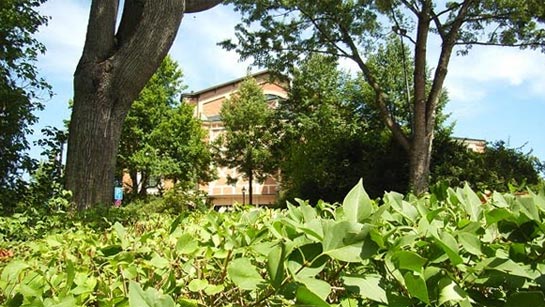
One of the most engaging was during a Meistersinger performance conducted by Hans Knappertsbush.
I was most fortunate to be able to sit in an unoccupied seat for both a Meistersinger and a Parsifal performance in the orchestra pit, and was able to watch the maestro close up, and in a wonderful environment. What an experience!
The Meistersinger performance remains most vivid to me (even though it's not a favorite opera of mine). Of course I was very young at the time, and had no idea of the gravity of any experiences that I was privy too, either in performance, rehearsal or personal (Wagner family activities especially!. Believe me there were many).
However – Meistersinger: During the final moments of Act II, it seems that the Night Watchman mixed up his words, and from what I gather, repeated his lines from his first entrance, rather than the hour later, which was required. All this was unclear from the sound that reached the pit.
Herr Kna. shouted something very loud, that I did not understand, at the singer on stage, with appropriate threatening gestures. I of course, could not hear the singer, being at the lowest level of the orchestra pit. The orchestra members seemed amused by this, but I doubt if they heard the mistake either. BUT!
The outraged Maestro threw down his baton and leapt off the podium. My impression, from what I knew of the Festspielhaus configuration, was that he disappeared totally from the singer's view on the stage. He proceeded to sit on the stage-right side of the conductor’s raised platform and pulled out a pack of cigarettes, lit up, and puffed until the end of the act! The orchestra continued, stifling giggles: the fire dept probably had fits, since the whole theatre is a tinderbox, (live flames, at least at that time totally verboten) and yet the audience had no idea what was going on. The act ended without a conductor! I really felt sorry for the singer who made the minor mistake. Certainly a moment I treasure! AND, a moment that the singer probably still has nightmares about!
But there is more...
Colin Bayliss • Clemens Bieber • Bea and Alec Bobotek • Stephen Charitan • Gary Campbell • Jerry Floyd • Sam Goodyear • Janette Griffiths • Diana Herbst • Hildegaard Arnold Kiel • Randall G. Malmstrom • Anne Midgette • Walter Meyer • Wouter de Moor • John F. Runciman • Per-Erik Skramstad • Brian Slater • Julia Thornton • Natalie Tsang • Mark Twain •
Gwyneth Jones and Chéreau
In 1979, while I was interviewing Dame Gwyneth Jones in Bayreuth, the soprano put her hands around my top of my head to try to explain why I found her Brünnhilde so sensual. As her hands pressed against my skull, an electric charge flowed through my body.
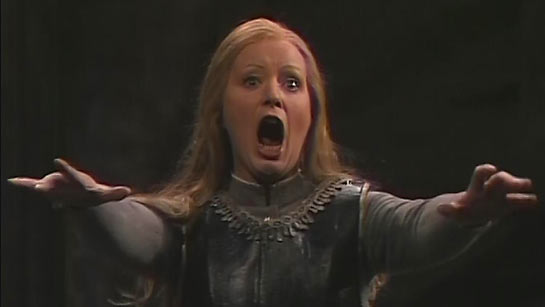
A couple of days later, thinking I was at the Haus Wahnfried museum, I knocked on Winifred Wagner's front door. A housekeeper answered and asked if I wished to see Frau Wagner. Because my trip was funded by the West German government and there had been a furor over Hans-Jürgen Syberberg's film, Winifried Wagner und die Geschichte des Hauses Wahnfried, I declined the offer. A mistake I regretted almost immediately and even more keenly after Frau Wagner died the following year.
In that pre-internet era, critics could only transmit reviews to newspapers via telex and all telex time was reserved by other writers. As soon as I completed attending seven Bayreuth performances, I took a train to Frankfurt, to file my review at the city's Associated Press (AP) office. The route from my hotel to the AP went through Frankfurt's red light district. Alhough I had watched Wagner's Blumenmaedchen cavort onstage in the Festspielhaus less than a day earlier, I was startled by the graphic, lurid erotic displays in many of the city's shop windows. I overcame my shock and my review was soon filed in Frankfurt and published in the now-defunct Washington Star.
I wrote of my admiration for Harry Kupfer's stunning Der fliegende Holländer but panned the Patrice Chereau Ring, using a snide term, "Chereaudaemmerung", to describe the production. A year later this Ring was taped and when it was telecast in the U.S., I realized how wrong I had been. I also completely understood why Dame Gwyneth expressed her enthusiasm about Chereau's direction in such a sensual, tactile way.
After seeing the Chereau-directed production of Janacek's From the House of the Dead at the Metropolitan Opera in December 2009, I am ever more convinced that Chereau is one of our very greatest directors. Since the centenary Ring cycle at Bayreuth, Tristan und Isolde is the only Wagner work that Chereau has directed. Here's hoping he directs Parsifal sometime soon.
Quite coincidentally, I saw Catherine Zeta-Jones in Sondheim's A Little Night Music in New York, just two days before the Janacek opera. Like Dame Gwyneth, Zeta-Jones is Welsh and the actress's lovely, lilting voice, her physical beauty, and sensual stage presence made me think of my encounter with Dame Gwyneth at Bayreuth 30 years ago.
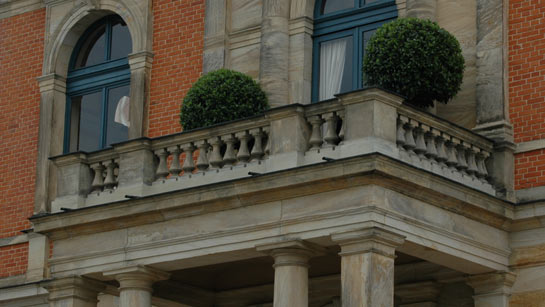
Colin Bayliss • Clemens Bieber • Bea and Alec Bobotek • Stephen Charitan • Gary Campbell • Jerry Floyd • Sam Goodyear • Janette Griffiths • Diana Herbst • Hildegaard Arnold Kiel • Randall G. Malmstrom • Anne Midgette • Walter Meyer • Wouter de Moor • John F. Runciman • Per-Erik Skramstad • Brian Slater • Julia Thornton • Natalie Tsang • Mark Twain •
First visit to the Bayreuth Festival
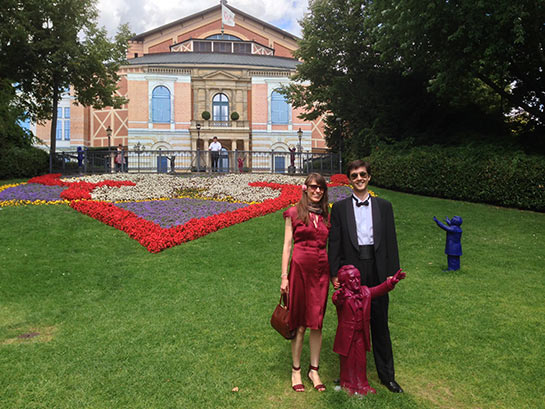
My parents like to remind me that when I was a small child, each year in the run up to Christmas I would become so excited that I would begin to feel ill. Sleeping the night before was impossible for me, with the idea that I might receive the latest offerings from both Sega and Nintendo simply too distracting a prospect. Could I really have a lifetime’s supply of Golden Apples and the Ring?! I’m almost certain that my six-year-old self would have renounced all love for a copy of Sonic the Hedgehog 2, but thankfully I was never given the option.
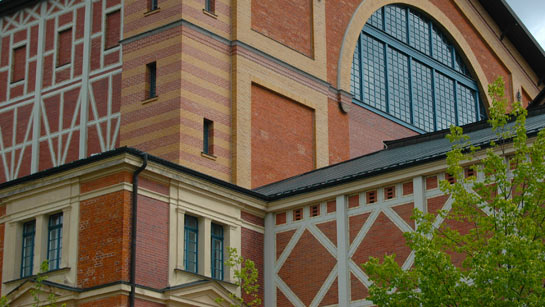
I mention this because, more than 20 years later, it is as close as I can get to describing how I felt the night before my first visit to the Bayreuth Festival. At some point in the previous year, I had talked with my girlfriend Jeanette about how wonderful it would be for us to attend a performance on the Green Hill one day. It is safe to say I never imagined that day would come this year, but after chancing on the news that some online tickets had been returned (via internet blogger Intermezzo, to whom I am indebted for the information), we began making our summer-holiday plans around a performance of Tannhäuser.
Staying in Nuremberg, we rose early on the morning of the performance so as to give us plenty of time to get there in the event of any last-minute hitches with the train service. If the disrupted sleep the night before hadn’t been enough of a clue that the big day had finally, surreally, arrived, putting on a hastily cobbled together dinner suit at 8am certainly was. And then it was swiftly on to the train, where initial butterflies that we might be headed somewhere other than Bayreuth were allayed by the arrival of a middle-aged man with long hair and one eye in the seat opposite - if Wotan were going, I knew we must be in the right place.
Upon arrival we took tea and coffee on the terrace of a rather lovely restaurant just where Maximilianstrasse and Richard-Wagner-Strasse meet, and had a short look around town before setting off for the Festspielhaus. Walking up to the building itself, I was put in mind of the opening of those DVD recordings of old festival productions, when one follows the camera up Siegfried-Wagner-Allee – it was magical to do it on foot. We were among the first to arrive for the day’s performance, and so had plenty of time to take some pictures, have a look around the gardens and at the monuments and memorials there, and then have a drink before the performance. And after having taken our seats, my mind again turned to the history of the festival as I saw the stage for the first time. I could almost see Windgassen and Nilsson standing there, Hofmann and Altmeyer, Jerusalem and Meier.
But what of this production though? I had read a fair bit about Sebastian Baumgarten’s controversial staging beforehand, so I knew that the director had been booed to the rafters in previous years, and that virtually nobody had a good word to say about it. Nevertheless, it is always best to make up one’s own mind about things and give everything a chance. Now having done so, my conclusion is that while the concept as a whole is flawed, there were nonetheless more than a few interesting ideas contained within it. If I may, I’ll start by outlining some of the things that did not work for me, before continuing with the happier task of talking about the things that did.
In my view, the downfall of this production really begins with, and is inextricably linked to, the genesis of the set designed by Dutch artist Joep van Lieshout - an independent art installation termed ‘the Technocrat’ containing a biogas plant and various machines that use waste to produce food and alcohol. This factory is the Wartburg, from the floor of which a large cylindrical cage representing the Venusberg rises.
Now, this in and of itself might not necessarily be a problem (although in this case I think it was). The more inherent problem stems from the fact that this installation was not designed specifically for the opera. Rather, it was an existing artwork, an exploration and study in circular systems, that the production team took and subsumed Tannhäuser into. As Baumgarten himself says in the programme notes, his idea was “to escape the hell of interpretative theatre…the opera has been integrated.”
But as much as much as he might say he wishes not to interpret the work, he does. The very nature of working in Bayreuth - with a fixed score, a specific mandate, and a ‘traditional’ performance space - means that he cannot avoid it. So having already decided the production will be ‘about’ the ideas contained in the Technocrat, he is then tasked with justifying this by somehow finding them within the opera.
What one gets then is rather like the result of someone taking jigsaw pieces that don’t fit and desperately bashing them with a hammer until they sort of stick together - perhaps some of the pieces will look alright, but the overall picture is going to be a complete muddle.
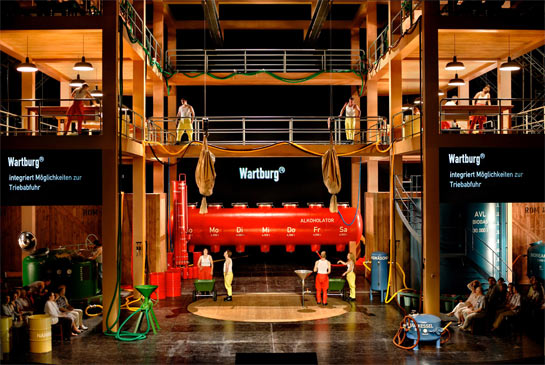
I suppose I can see how the autarkic yet interdependent functioning of the biogas plant, with everything needing everything else to properly function, could be a metaphor for our hero needing both Wartburg and Venusberg. But even accepting this point, I just don’t think the setting serves enough other, less generalised dramatic purposes to justify itself. People operate the machines at various times, and drink the alcohol, but it is all rather confusing and difficult to work out what it is supposed to relate to.
Another difficulty with the Technocrat is its complete physical dominance of the performance area, but comparative lack of use theatrically. The three-storey structure takes up a great deal of the stage in a rather intrusive way, almost creating a second proscenium arch from within. Sightlines were therefore compromised - I could not see much at all of what was projected on to the back of the stage from my seat in the right stalls. This might be justifiable if the structure were utilised and integrated into the drama, but it isn’t really. In fact, pretty much all the main action of the opera takes place at ground level. The upper floor is barely utilised at all, save for some people sleeping there. And aside from a nice image of a prayerful Elisabeth one floor up at the end of the piece, even on those occasions where major characters do appear within the installation proper there often seems to be little or no dramatic point in them being there rather than anywhere else. Given it was not designed with that in mind, why would there be?
And then there is the director’s attempt to explain the set’s existence by creating a back story. Apparently, the whole thing is actually a play within a play, and the workers in the factory like to perform Tannhäuser to break up the monotony of their lives. I really think this makes absolutely no sense at all – why would they choose this opera, and if they do, does that mean that all these animal creatures in cages are just people acting? In any case, I don’t think this back story comes across clearly in what is presented on stage; at least it didn’t to me.
I believe the most important question one must ask about any set design is ‘how does this help to bring out meaning and ideas in the work?’ For me then, the answer in this case was that it simply did not, at least not enough. It was less “obsessive installation”, more oppressive backdrop. To a certain extent one can simply ignore the Technocrat and concentrate on the primary characters, but of course that is far from an ideal state of affairs.
As much of a downside as this was, the low point of the production though was definitely the opening scene in the Venusberg. I get the message - indeed it would be hard to miss it - with the giant sperm dancing away or playing dead depending on what Venus and Tannhäuser were singing about, but it’s pretty obvious stuff and presented in truly ridiculous fashion. Maybe the crudeness of its presentation is supposed to represent the base instincts of the Venusberg? Even if this was the idea it was not a good one, as it was hard not to simply laugh, and it removed all tension and theatrical power from Tannhäuser’s decision to leave.
To a lesser extent, I was also unsure about the introduction of Venus into the song contest. I think this could have worked, if perhaps Venus had been there as a vision only Tannhäuser could see. But if the other minnesingers recognise Venus, greet her, and accept her presence at the back, why are they so angry when Tannhäuser sings his song to her? It also occurred to me that having Tannhäuser sing to Venus because he actually sees her there makes his conflict less internal, which I wasn’t sure was a good thing.
And unfortunately, there was an additional problem of the director seeming rather indifferent to the music. To be fair, some effort was made to have characters respond to the musical line during purely orchestral playing, most notably in the Prelude to Act III which provided interesting viewing. But once people started singing this largely went out of the window, and there were passages that were curiously close to old-fashioned ‘park and bark’. Given Baumgarten’s seeming willingness to engage more with orchestral music, it seemed doubly a shame not to have the Venusberg music from the Paris version.
But as I said, and I would like to emphasise this, I really did not think it was all bad. Some of the themes brought out by Baumgarten when he allows himself to simply interpret the work are I think, genuinely valid and thought provoking. For example, I did like many of the production’s attempts to reduce polarity between the Wartburg and the Venusberg, and tied in with this, I thought the idea of having Venus give birth to Tannhäuser’s child at the end was particularly interesting. As I saw it, this was not purely Venus’ child we were seeing but rather Elisabeth’s child, conceived, borne and delivered by Venus as surrogate. What we have then is a Virgin Birth, Tannhäuser’s salvation lying with Maria’s definitive act. The redemption of Tannhäuser comes with the birth of the Christ child, but only when the representatives of sensual and spiritual love work symbiotically.
I also thought the production did a good job of avoiding Wolfram simply playing Horatio to Tannhäuser’s Hamlet. The character certainly has conflicted feelings of his own and I think it is important to explore these for their own sake, as well as in contrast to Tannhäuser’s. Having him sing his Lied an den Abendstern directly to Venus, with the evening star of course being another name for the second planet out, was just one example of the production asking the audience to question Wolfram’s thoughts further. When he is thinking of Elisabeth, is his mind not also on Venus?
And whilst I have reservations, not least because it has surely become a theatrical cliché, there is at least some mileage in the strictness and orderliness of both the Wartburg and religious piety being represented by a cult-like group in an Orwellian dystopia. Aside from anything else, the sight of people being shipped off in a crate to be ‘cured’ was a reasonably powerful image depicting religious intolerance.
Moreover, musically things were largely very good. Torsten Kerl gave an admirable performance as Tannhäuser. The role’s punishingly high tessitura was negotiated without any noticeable tiring, and his tenor had enough of the helden about it while also retaining a pleasing tone. Dynamics could perhaps have been a little more varied, but then again much of the role demands volume. His acting was solid rather than spectacular, but a jack-the-lad persona in the first two acts was well conveyed.
Camilla Nylund’s Elisabeth was thoughtfully portrayed, and the strength of her theatrical commitment stood out. Perhaps this was no coincidence given that she is the only remaining principal from the original 2011 run and, as evidenced by comments from Baumgarten in the programme notes, she genuinely believes in the concept of the production. Vocally she also performed well, particularly in the middle register, lacking only a real fifth gear in terms of volume, and perhaps a touch more fullness of tone above the stave.
If I were less enthusiastic about Michelle Breedt’s Venus than some other performances, this was no doubt partly down to the fact that some of her key scenes were the ones in which I thought the director missed the target by the largest amount. Nevertheless, her vibrato was on occasion slightly too wide for my liking.
But a mention must go to Bayreuth stalwart Kwangchul Youn, who proved a fine Landgraf Hermann. He was rich in voice and authoritative on stage, and with the smaller minnesinger roles also well taken, the sextet to close the first act included some very fine singing.
The standout performance of the evening though came from Markus Eiche as Wolfram von Eschenbach, whose musicianship was of the absolute highest quality. A beautiful tone was allied to careful phrasing, dynamics and attention to words, which coupled with equally strong acting skills meant that his Ansprache and Lied an den Abendstern were genuinely moving, and two of the highlights of the evening.
Moving away from the principals, the chorus demonstrated effortless power and the final reprisal of the Pilgrim’s Chorus was literally spine tingling. There were some instances of a machine-gun approach to final consonants which could have been tidier, but this did not detract very much from the overall effect.
The sound of the orchestra from the famous covered pit was one of the things I was most looking forward to experiencing live for the first time and it did not disappoint. The strings shimmered, the trombones were beautifully mellow, and oboe lines seemed to be coming from the ceiling. I’m not sure how much of the orchestral texture was down to the acoustic and how much was down to Axel Kober’s direction in the pit, but there were certainly some beautiful sounds produced. Kober’s tempi were I think largely uncontroversial, and at least to my layman’s ears he seemed to give a good account of the score.
All in all then, despite its flaws I found the production interesting and enjoyable. The rest of the audience seemed to as well, with all the principals, the chorus, its master, and the conductor receiving sustained appreciation at the curtain. One man a few rows behind me did shout something during the staged Eucharist just before the beginning of Act 3 which Jeanette reliably informed me translated as ‘get off, this has nothing to do with opera’. But he was joined by only a few fellow Neanderthals, and seemed more a source of amusement to most people around him. If only I spoke German, I would have informed him that if there is one thing in the world that definitely has nothing to do with opera, or indeed any art, it is that sort of behaviour, but alas. Sebastian Baumgarten was not in attendance so we’ll never know what the reaction would have been to him on that particular night.
And that was that. Just enough time to take one last look at the Festspielhaus, grab a McDonald’s and get the last train back to our hotel. Sublime, ridiculous and all that. It’s now two weeks since we flew back to England, and the whole trip still seems just as wonderful as it did at the time. I really can’t say enough about how special the experience of attending the festival was, and I feel very lucky to have been. Both Jeanette and I are in agreement that it was one of the most amazing days we’ve ever had, and we simply can’t wait to go back again.
Colin Bayliss • Clemens Bieber • Bea and Alec Bobotek • Stephen Charitan • Gary Campbell • Jerry Floyd • Sam Goodyear • Janette Griffiths • Diana Herbst • Hildegaard Arnold Kiel • Randall G. Malmstrom • Anne Midgette • Walter Meyer • Wouter de Moor • John F. Runciman • Per-Erik Skramstad • Brian Slater • Julia Thornton • Natalie Tsang • Mark Twain •
Janette Griffiths: First time at Bayreuth
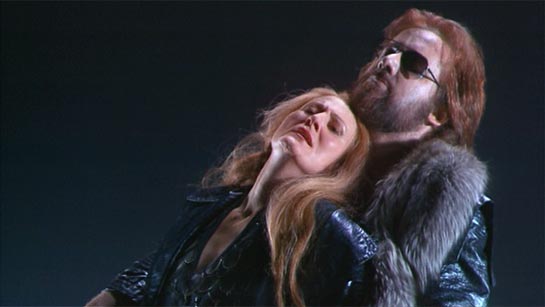
On a hot summer's evening in Paris in 1988, two French friends phoned me from a Bed and Breakfast in Bayreuth, Germany. Marc and Pierre were preparing to go to the opera. Nothing new - Marc and Pierre spent their lives preparing to go to the opera. Or in the case of Pierre, the more emotional of the two, recovering from going to the opera. Pierre lived his "vie lyrique" as he described the abiding passion of his life, at a very intense level. Joan Sutherland's final "Lucia" left him too moved to speak for 24 hours. "Parsifal" in virtually any production, would leave him in a week-long state of swoon. And that evening, there they both were, Pierre, the emoter, and Marc, the organizer in a Bed and Breakfast just a few yards from the Festspielhaus. The following day would see the beginning of "Der Ring des Nibelungen." This Ring cycle would also mark the debut of a respected but not particularly well-known British bass, John Tomlinson, in the role of Wotan.
I did know Tomlinson's work. I had seen him sing to his coat as Colline in La Boheme at the ROH, and in the much more spectacular role of Baron Ochs in Strauss's Rosenkavalier at ENO. I knew that this was a Titan of a man onstage. Tomlinson, as Wagner's flawed and troubled god, could it seemed, move the character away from the gloomy, stately old man of some earlier productions and bring his volcanic energy to a much younger incarnation. I'd told my French friends as much. Thanks to Marc, the organizer, they had applied for Bayreuth tickets a couple of centuries in advance and were headed for a local bierstüberl in happy anticipation of an early sausage supper and a great evening of opera.
I, on the other hand, seem to lack the bit of the brain that plans. I had no ticket to Bayreuth but, as an Air France employee, I did have free air travel. Two minutes into my conversation with Pierre and I knew that I had to jump on a plane to Nuremberg and ride a train to Bayreuth where I would take my chances at getting a last minute ticket for the following day's Walküre..
Next day, there I was, walking for the first time in my life up the green hill to the Festspielhaus. I would like to say that I was moved and excited but, in truth, I was frazzled by the travel and anxious that this was a barmy undertaking that would leave me locked outside the theatre. A small part of me hung on to a hope that I would get a returned ticket. Looking at the stately opera-goers headed up the hill was heartening. Many of them were quite old, some a tad infirm. Surely somebody would keel over before Die Walküre started?
Mark and Pierre were happily anticipating their evening. So, I saw at the top of the hill, were scores of hopeful, would-be opera-goers. Ticket hunters were everywhere and all more organized and alluring than I could ever hope to be. There were women and a few men dressed as Brünnhilde. There were several Wotans and even a couple of Hundings. Some people had drawn cartoons on posters explaining their need for a ticket. Others held up simple banners. I had nothing.
The trumpeters came out onto the Bayreuth balcony to summon the audience. Marc and Pierre wished me luck and disappeared inside. So did most of those resourceful hopefuls. Soon, the bustling little square in front of the theatre was empty - except for me and the Bayreuth fire engine, oh and an English couple with their teenage son who had drawn lots: one act per family member.
I lost heart and drifted back down the hill to have a cup of tea on a patio next to the more ornate old Margrave theatre. In all my years of opera-going, I had never failed to get in at the last minute. I would always declare airily that: "Wagner (or Puccini or Verdi or Strauss) knows I love him and will look after me." They always had but now, in his spiritual home, Wagner had abandoned me. Forlorn and disappointed I wandered back up to the theatre. I even walked round it a couple of times, thinking that I might be able to hear something, anything but all I could hear was birdsong and the distant hum of traffic. The audience spilled out. Pierre and Marc were in a state of high excitement. "Tomlinson est epoustouflant!" cried Pierre. "C'est un Wotan volcanique! Titanique!" Well yes, I knew that. "C'est la plus grand soirée de ma vie lyrique!" added Pierre never a paragon of tact. And back they all went inside - all except me. I wandered around the lovely gardens on the hill, admired the flower beds and tried to take consolation, as did all my great composers, in nature. But roses and beech trees and blackbirds brought no comfort that evening. I debated returning to the B and B but I couldn't resist returning to the Festspielhaus one more time. The audience flooded out into the gardens after the second act. Pierre was in near-swoon again when, Marc, ever calm, logical and organized said, "Now that you are here, why don't we see if you can, perhaps, just look inside the theatre?" He led me towards the door and up the stairs. Nobody stopped me. I was walking up the stairs inside the Bayreuth theatre! Soon I was in the box that Marc and Pierre were sharing with two other people. The auditorium was empty during the long meal-length interval. I could gaze at the theatre and imagine all that I was missing. I had settled for doing just that when I heard Marc asking a passing usherette if "Madam could, perhaps, just stand at the back of the box for the last act?" "Why would she do that?" asked the usherette, "when the other people went home and she can sit down?"
I was in! And I was in for Wotan's great farewell, what I consider, the most moving and beautiful passage in the whole Ring Cycle if not in the whole of western music. The lights dimmed, I took my seat. I did not, of course, see Barenboim making his way to the podium. This was, after all, Bayreuth where he was probably in blue jeans and t-shirt under the roof that Wagner himself had decreed should be installed over the orchestra pit. So in the absolute darkness that is Bayreuth, I waited for the arrival of the Valkyries, and, later for Wotan/Tomlinson himself. I would like to say that I sat thrilled and moved beyond description. I would like to say that, as for Pierre, it was the greatest evening of "ma vie lyrique." However, the shock of my sudden arrival overwhelmed the performance itself. Throughout the Valkyries ride and the first entrance of Wotan, I was too stunned to take in much of the action onstage. And when I did...when I finally did …
Well, the Kupfer production was thrilling in its energy and drive but visually his use of geometric, laser-lit shapes was disappointing and unexciting. As for Tomlinson, well he played Wotan as he would continue to play him for most of his career - as a raging, foaming at the mouth, mad-dog of a god. Alas, and how heartfelt is that 'alas', I never quite agreed with that interpretation. Vocally, back then, the man was stupendous and tireless. Neither he nor any of the other singers were served by a production that, while exploding with energy, still lacked visual excitement. Dark, dark sets and dreary laser cubes of light replacing Wagner's flames. For me Sir John found his Wagnerian calling when he went on to pour that unflagging drive and energy into Hans Sachs in Graham Vick's gorgeous production at Covent Garden. There we had one of the greatest performances of the 20th century.
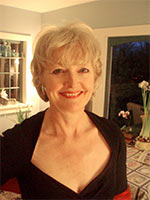
Janette Griffiths is an award-winning journalist and novelist who writes on travel and culture for national newspapers in the UK. Her novel "The Singing House" about a great Wagnerian bass-baritone was described by Booker Prize winner, Hilary Mantel as "unashamedly romantic, crisp and witty." It was recently launched on Kindle as an inter-active story complete with links to live performances of the Wagner and Verdi operas that drive the narrative. Janette has lived in Paris, Chicago and Florence and currently divides her time between London and Vancouver. She has a batch of blogs on subjects including Italy, France and Wagner. Links to them all can be found at www.janettegriffiths.com
Colin Bayliss • Clemens Bieber • Bea and Alec Bobotek • Stephen Charitan • Gary Campbell • Jerry Floyd • Sam Goodyear • Janette Griffiths • Diana Herbst • Hildegaard Arnold Kiel • Randall G. Malmstrom • Anne Midgette • Walter Meyer • Wouter de Moor • John F. Runciman • Per-Erik Skramstad • Brian Slater • Julia Thornton • Natalie Tsang • Mark Twain •
On the Hallowed Green Hill at Bayreuth…
Walking up the green hill through the gardens to the Festspielhaus at Bayreuth sets the mood for memorable performances of Wagner’s music dramas. What attracts so many of us to Wagner’s works is the all-encompassing physical and emotional response to the music, words and visuals on stage.
Der Ring des Nibelungen, August 2008
![]()
Götterdämmerung. Photo: Enrico Nawrath/Bayreuther Festspiele
The current production of Der Ring des Nibelungen by Tankred Dorst did not disappoint. The production complemented Wagner’s music and text beautifully.
Dorst set the Ring in modern day with many of the scenes taking place in vacant human premises, such as a vacant highrise, an empty school, a discarded quarry and a cut-down forest with a partially built freeway. The Gibichung hall in Götterdämmerung was a representation of the now uninhabited Vittoriale degli Italiani on Lago di Garda built by the poet Gabriele d’Annunzio in the last century and where many lavish parties with his friends took place. Costumes of the gods throughout were lush reminding me of modern-day Japanese fashion art. Elaborate masks were utilized to depict many of the characters. Hunding’s men wore dog masks and acted as a pack of dogs. Fricka was accompanied by two attendants wearing ram’s heads.
Dorst emphasized the objectivity of experiencing the Ring by keeping all of the gods, demi-gods and humans separate. In almost every scene there were humans, often children or young adults interacting realistically with the surroundings, but who were oblivious to the drama taking place among the gods and demi-gods.
Dorst created Götterdämmerung to be a real culmination of the Ring epic. He depicted all of the Ring characters up to that point from Rheingold, Walküre and Siegfried as guests in the Gibichung hall. One could make out among the guests, who were Wotan, Fricka, the Rheinmaidens, Siegmund, Sieglinda, Loge, etc. And in Götterdämmerung even we, the audience, were included! Our shoes were lined up at the front of the stage before the Gibichung hall. The real Rheinmaidens, when they appeared at the beginning of Act III, carried mirrors, reflecting us in the audience.
The ending of the Ring can sometimes be a letdown and is often controversial. In this production the fire in the hall is intense (with the guest representing Loge being the last to flee!) burning up the worlds of the gods and demi-gods. The denouement was left for the humans in the real world. A young couple with a bike pass through the surroundings. They stop. The young woman offers her partner a cup of water from a thermos – just like Sieglinde offering Siegmund a cup of water; just like Arabella offering Mandryka a cup of water…. The real world and real life continue on.
Of course, the blend of voice and orchestra in the famed Festspielhaus is unsurpassed. The singing overall was good, but as in all Ring productions there were inconsistencies. Outstanding was the Sieglinde, Eva-Maria Westbroek from the Netherlands. Watch for her as a Brünnhilde in 10 years time. Stephen Gould as Siegfried and Linda Watson as Brünnhilde were memorable. The conductor, Christian Thieleman, had the orchestra playing louder than many conductors would have done leaving one with the impression that he was not as sensitive to the needs of singers as an opera conductor should be.
Tristan & Isolde, August 2008
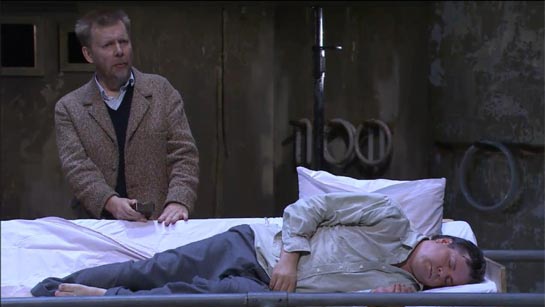
Jukka Rasilainen as Kurwenal attending the dying Tristan (Robert Dean Smith).
Tristan & Isolde is normally the most sensuous opera staged today, however this production by Christoph Marthaler was anything but passionate. It was weird, bizarre, comic and absurd. With the production of the Ring separating out the lives and drama of the gods and humans, was this a separation of a drama among robots with autistic characteristics (i.e., Tristan and Isolde) and humans represented by the observer, Kurvenal, Tristan’s loyal companion? The time period of this production spans the 1920’s to the 1950’s as depicted in Isolde’s costumes from Act I to Act III, yet Kurvenal is the only character who ages throughout. The other characters are unchanged as if they were not real. The only contact among the characters was occasionally with the hands– even eye contact was nonexistent. Is this not what one would expect with interacting automatons?
All of the action, or in this case, non-action takes place on a ship with three levels. Act I is in a room on the main deck, Act II on a lower deck and Act III in the hull of the ship. So the mechanical characters remained in the same mechanical setting for the entire drama.
The singing and diction of Robert Dean Smith as Tristan and Robert Holl as König Marke were superb, while the Swedish soprano, Iréne Theorin as Isolde was totally unintelligible.
One music critic called this production an example of current German music theater, but I am not sure it could be called a good or even mediocre example of music theater in Germany today. It was certainly not an opera to which the audience could respond with all of their senses. Nor is it a production I would care to see again.
Der Meistersinger von Nürnberg, August 2008
![]()
Katharina Wagner's production of Die Meistersinger von Nürnberg. Photo from 2009: Enrico Nawrath
What an absolute delight to see!! This controversial production of the Meistersinger is by Katharina Wagner, the 29 year old great-granddaughter of Richard Wagner, who is also now the new Co-director of the Wagner Festival in Bayreuth. In this production she remains true to the music and text as originally written, but places the opera in an entirely different context. Rather than a singing competition, it is set in the world of painting and art. Hans Sachs, sung by Franz Hawlata, is a barefoot poet/artist rather than a master shoemaker. Before the final competition, Katharina pokes fun at previous artists/poets/composers, Richard Wagner being one of them. These, depicted by actors wearing grotesque caricatured masks, must be, and were, disposed of before a new world of art can result. However, as is so typical today, as soon as Walther von Stolzing (Klaus Florian Vogt) wins the contest, a promotional contract is signed and off he goes to commercialize his art, leaving the Beckmessers of the world to carry on in the art world. In fact, in this production it is Sixtus Beckmesser (Michael Volle) remaining true to his art, who is the real hero.
This production, which opened last summer, was not appreciated by many critics and members of the audience. However, a surprising number did like it. One opera goer commented that if this is an example of Katharina Wagner’s creativity, then she had her support as the new Co-director of the Festival. We await future new productions under her helm.
Parsifal, August 2008
![]()
Act 3 of Stefan Herheim's production of Parsifal.
Photo from 2009: Enrico Nawrath
This is the opera that was written specifically for performing in the Festpielhaus. It was beautifully sung with absolutely perfect balance with the orchestra led by Daniele Gatti. In this fascinating production with very elaborate staging the Norwegian Director, Stefan Herheim, used Parsifal and the search for the Holy Grail as a metaphor for the development of Germany as a nation up to the present day. This interpretation was extremely effective.
Act I set in the 1880s depicts the birth of Germany as a nation with the birth of an innocent Parsifal. Christianity was an important aspect in the formation of Germany and this scene exudes Christian symbolism with angels, a Christ figure (Amfortas sung by Detlef Roth) religious rituals, etc. It ends with a rise in German nationalism and the beginning of World War I.
![]()
Parsifal (Christopher Ventris) with the swan he has shot. The swan is Parsifal as a boy. Gurnemanz (Kwangchul Youn) is appalled.
Act II opens with a country bewildered, in poverty and in need of healing as it was after the first World War. Germany in the 1920s and 30s was ripe for an increase in decadence as represented by an androgenous Klingsor (Thomas Jesatko) and Zaubermädchen, who sometimes were depicted as nurses and at other times chorus girls. Kundry, beautifully sung by Mihoko Fujimura, looked like Marlene Dietrich’s famous Blue Angel from the 1930s. The rise of Nazism with its promises of love, honor and protection of the German culture and the beginning of World War II end the second act.
As Act III opens the war has ended and the country is in shambles. Kundry and Gurnamanz (Kwangchul Youn), depicting the surviving German populace, are devastated, but are still there to serve and rebuild. Parsifal, sung by Christopher Ventris, as the redeemer heals Amfortas’ wound. Titurel (Diógenes Randes) and the old order finally die. The staging then moves to the Bundestag where the new government is formed. The opera ends with a giant mirror on stage reflecting the well-dressed affluent audience and present day Germany.
This interpretation by Herheim worked beautifully and was very emotional to experience. Why did it take a non-German like Herheim to use Parsifal as a metaphor for Germany in this manner?
This production also marked the end of an era. Wolfgang Wagner, who had been with the Festspiel for 58 years, 42 of which were as the sole Director, was stepping down. He joined the singers on stage for bows and a standing ovation from a very appreciative audience.
Diana Herbst, October, 2008
Colin Bayliss • Clemens Bieber • Bea and Alec Bobotek • Stephen Charitan • Gary Campbell • Jerry Floyd • Sam Goodyear • Janette Griffiths • Diana Herbst • Hildegaard Arnold Kiel • Randall G. Malmstrom • Anne Midgette • Walter Meyer • Wouter de Moor • John F. Runciman • Per-Erik Skramstad • Brian Slater • Julia Thornton • Natalie Tsang • Mark Twain •
Never the same way since
Bayreuth is far more than the sum of its parts. When I first went as a young and rather green opera critic, excited but a little daunted at the prospect of seeing six Wagner operas in seven days, I expected it to be a rather intellectual week that would be, on some level, good for me. I expected the musical standards would be a lot better than I found them. I didn’t expect that it would be a week of pure fun.
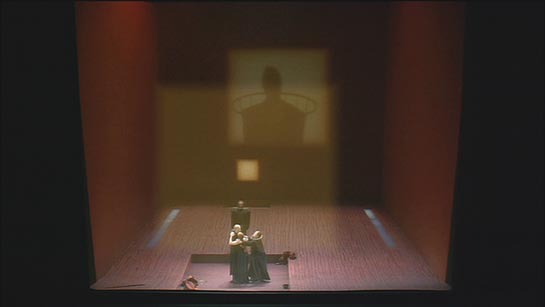
I drove up from Munich (where I then lived) and arrived at the cheapest pension I had been able to locate, only to find that it was filled with other critics from all over Europe operating on similarly restricted travel budgets. With its bare wood floors, modest furnishings, and communal breakfasts, the building was like a dorm at summer camp, except that the other campers were all male, generally older than I, and happy to talk to me all day about Wagner in English, French, and German. In short: I immediately started to have a great time.
Bayreuth represented a sea change in my relationship with Wagner’s operas. I had seen all of them live at that point, had listened to recordings for hours, had loved many of them, and had, I think, in some way fundamentally failed to understand them – to understand, particularly, the way that they require you to give yourself over to them. The way to see Wagner is to focus your whole day on Wagner. A leisurely breakfast, a stroll through town or excursion to some local destination (I was, at the time, inflamed with enthusiasm for Wilhelmine of Bayreuth, and still vow I’ll write a book about her some day), a bite of lunch, and it was time to start dressing for the four o’clock curtain. Wagner doesn’t even seem long if you have no other distractions; the operas are the perfect length when they begin in the late afternoon and you have an hour between each act to digest what you’ve heard, eat, talk, or wander among the crowds of people in evening wear hoisting huge beer mugs (this is, after all, Bavaria) on the grounds.
Together with my colleagues, I smirked at the obsessive passion of the die-hard Wagnerians, like the Frenchman who took violent exception to the criticisms a French colleague and I, thinking ourselves protected by our choice of language, were making about Siegfried Jerusalem’s “Tristan” during intermission (“Do you know how hard that role is to sing?!” “Perhaps,” my colleague remarked drily after the infuriated man had retreated, “but when I come to Bayreuth, I still expect to hear it sung well”). As a foreigner, I wasn’t as bothered as some of my German friends by the old-line, right-wing aura hovering over much of the audience – I simply wasn’t as attuned to it as they were. And I was perfectly aware that the productions – this was the year of the Alfred Kirchner “Ring” and the new Wolfgang Wagner “Meistersinger” (in which I heard Renée Fleming for the first time) – were only so-so. So you can only attribute the magic to the music, which works in spite of everything. I emerged from that week of total immersion with a mad, genuine, and abiding love of Wagner. I have never heard the operas in quite the same way since.
First published on Anne Midgette's blog The Classical Beat
Colin Bayliss • Clemens Bieber • Bea and Alec Bobotek • Stephen Charitan • Gary Campbell • Jerry Floyd • Sam Goodyear • Janette Griffiths • Diana Herbst • Hildegaard Arnold Kiel • Randall G. Malmstrom • Anne Midgette • Walter Meyer • Wouter de Moor • John F. Runciman • Per-Erik Skramstad • Brian Slater • Julia Thornton • Natalie Tsang • Mark Twain •
Bayreuth 2011
After a career in the medical profession, where holidays had to be booked 12 months in advance, retirement suddenly opened up a Pandora's box of operatic possibilties.
Where better than to start at the top of the operatic mountain (my other passion), so it was to Bayreuth that I was to go but alas the chance of such a mere novice obtaining tickets was impossible so when I was not allocated any tickets my plan was hatched.
Flights at that time from Manchester to Munich were so cheap I booked two weekends during the Festival (£35 return) and waited until just before the Festival opened. I was to travel up from Bregenz, having seen Andre Chenier the previous evening, but the train arrival time prevented my joining the queue for returned tickets.
I hoped that a phone call to the booking office might just locate just one ticket on either of the weekends I had booked.
Joy of joy, Frau Benker offered me two tickets, one for the opening night of the 2011 Tannhauser (I am still trying to understand the concept) and for the following night to see Die Meistersinger. Having changed suits on the train from Munich I felt rather conspicious walking onto such hallowed ground and though dressed appropriately, the cloakroom lady was taken aback to be asked to store my trolley case.
And so to the 'Gods' we climbed but I was on the front row and, surrounded by ladies of all ages in gorgeous long gowns, we waited in reverential silence as the lights dimmed. The opening bars of Tannhauser were magic and the magic lasted until the very last note. Such a 'different' production was not going to please all but the booing next to me was by far outweighed by the rapturous applause and footstamping of those behind and below me.
The weather was perfect and before the performance we were 'entertained' by the arrival of the rich and famous and in the intervals the restaurants had a huge variety of tasty food in a relaxing atmosphere under the summer's evening sun.
It was a magical trip which included a more traditional Meistersinger the following evening and the next a flight back home to Manchester with Wagner ringing in my ears.
What a glorious start to retirement - I will return.
Colin Bayliss • Clemens Bieber • Bea and Alec Bobotek • Stephen Charitan • Gary Campbell • Jerry Floyd • Sam Goodyear • Janette Griffiths • Diana Herbst • Hildegaard Arnold Kiel • Randall G. Malmstrom • Anne Midgette • Walter Meyer • Wouter de Moor • John F. Runciman • Per-Erik Skramstad • Brian Slater • Julia Thornton • Natalie Tsang • Mark Twain •
Wagner's entire Ring Cycle live, on stage in Bayreuth
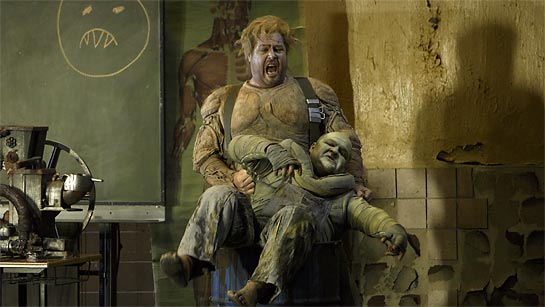
Siegfried and Mime, Act 1 of Siegfried. Photo Enrico Nawrath
My lifelong wish, to experience Richard Wagner's entire Ring Cycle live, on stage in Bayreuth, was granted this year!
I will forever treasure this unique experience!
Being an undying romanticist though, I would like to voice my disappointment relative the choice of costumes as well as the various stage settings.
For example:
During most of the performances Siegfried looked like a scavenger, the scantily clad Rhinemaidens, on account of their portliness, pathetic:
While the music was beautifully played (conducted by the fabulous Christian Thielemann) and the singing was convincing, the interjection of modern day characters, that had absolutely nothing to do with Wagner's original scripts, like children playing games, adults walking about wearing blue overalls and yellow crash helmets, riding bicycles or reading newspapers, disrupted the audience's concentration and took away much of the enthrallment created by the singers' rendition of their role! I have yet to find someone to explain to me why this is being done, as nobody (that I ask) seems to understand these insertions at all!
In my opinion operas should be presented the way they were conceived by the composer, true to the time of action: Why would I want to go and hear an opera, the story of which plays - let us say - in the 17th century, only to see it performed in today's attire and surroundings, with the use of contemporary utensils! Where can there possibly be my chance here to elude the present day grind for two to four hours, which - after all - allegedly is the desired purpose?
And by the way, the broken telephone pole (ash-tree???) in Hunding's dwelling and the square, narrow walled-in confinds, where the Valkyries ride into instead of onto (a plateau), made no sense and did not meet with much enthusiasm either.
Other than that, this (my) experience of the entire event was truly remarkable and not to be missed!
Photos
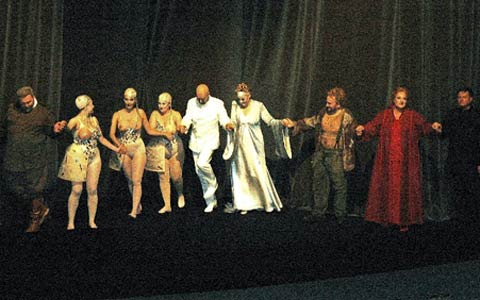
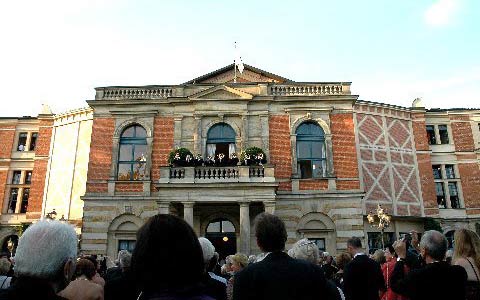
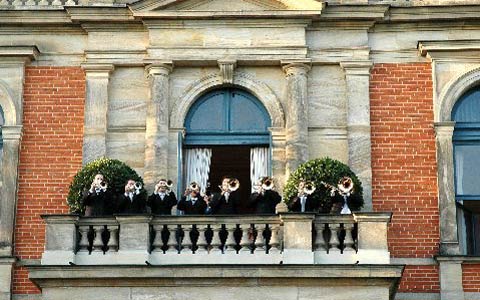
Photos by Hildegaard Arnold Kiel
Colin Bayliss • Clemens Bieber • Bea and Alec Bobotek • Stephen Charitan • Gary Campbell • Jerry Floyd • Sam Goodyear • Janette Griffiths • Diana Herbst • Hildegaard Arnold Kiel • Randall G. Malmstrom • Anne Midgette • Walter Meyer • Wouter de Moor • John F. Runciman • Per-Erik Skramstad • Brian Slater • Julia Thornton • Natalie Tsang • Mark Twain •
John F. Runciman: Bayreuth in 1897
To Bayreuth again, through dirty, dusty, nasty-smelling, unromantic Germany, along the banks of that shabby—genteel river known as the Rhine, watching at every railway station the wondrously bulky haus-fraus who stir such deep emotions in the sentimental German heart; noting how the disease of militarism has eaten so deeply into German life that each railway official is a mere steam-engine, supplied by the State with fuel in case he should some day be needed; eating the badly and dirtily cooked German food,—how familiar it all seems when one does it a second time! One week in Bayreuth was the length of my stay in 1896; yet I seem to have spent a great part of my younger days here. The theatre is my familiar friend in whom I never trust; the ditch called the river has many associations, pleasant and other; I go up past the theatre into the wood as to a favourite haunt of old time; I lunch under the trees and watch the caterpillars drop into my soup as though that were the commonest thing in the world; I wander into the theatre and feel more at home than ever I do at Covent Garden; I listen to the bad—but it is not yet time for detailed criticism. All I mean is, that the novelty of Bayreuth, like the novelty of any other small lifeless German town, disappears on a second visit; that though the charm of the wood, of the trumpet calls at the theatre, of the greasy German food, and the primitive German sanitary arrangements, remains, it is a charm that has already worn very thin, and needs the carefullest of handling to preserve. Whether, without some especial inducement, the average mortal can survive Bayreuth a third time, is, to me, hardly a question. As for my poor self, it suits me admirably—certainly I could stand Bayreuth half a dozen times. I like the life—the way in which the hours of the day revolve round the evening performance, the real idleness, passivity, combined with an appearance of energy and activity; I like to get warm by climbing the hill and then to sit down and cool myself by drinking lager from a huge pot with a pewter lid, dreamily speculating the while on the possibility of my ever growing as fat as the average German; I like to sit in a café with my friends till three in the morning, discussing with fiery enthusiasm unimportant details of the performance we have lately endured; I like being hungry six times a day. All these trifles please me, and please others. But the majority of the crowd of visitors are not pleased by them; and what can they do in Bayreuth after the freshness of novelty is worn off? They go to Villa Wahnfried and look for a few seconds at the spot where Wagner is buried—as I heard it said, like a cat in a back garden; they look for a few seconds at the church; they lunch; they buy and partly read the English papers; and then? Inevitably the intelligent reader will say, the opera in the evening. And I, who have been to the opera in the evening, gasp and remark, Really!
Lest this ejaculation be entirely misinterpreted by the irreverent, let it be said at once that the performances are not, on the whole, very bad. But I wish to consider whether they are of a quality and distinction sufficient to drag one all the way from England, and to compensate those who find the day dull for the dulness of the day, whether they are what Bayreuth claims them to be—the best operatic representations in the world, the best that could possibly be given at the present time. The circular sent out by amiable Mr. Schulz-Curtius states that, "while not guaranteeing any particular artists, the aim of Bayreuth will be to secure the best artists procurable" (or words to that effect). Is this genuinely the aim of Bayreuth, and does Bayreuth come near enough to the mark to make some thousands of English people think they have spent their time, money, and energy well in coming here? For my part I say Yes: even were the representations a good deal poorer, they form, as I have said, a centre for the day; I rise in the morning with them before me, and make all my arrangements—my lunches, discussions, and lagers—so as to reach the theatre at four o'clock; they save me from a life without an object, and add a zest to everything I do; they correspond to the trifling errand which renders a ten-mile walk in the country an enjoyment. But those who come here for nothing but the theatre, who do not feel the charm of the Bayreuth life, will, I am much afraid, answer No. Had I no friends here, or did I not enjoy their company and conversation, if my stomach refused lager and I could not smoke ten-pfennig German cigars, if I were not violently hungry every two hours, I am very much afraid I should answer No. The working of the scenic arrangements is, of course, as perfect as ever. Of course there are one or two mistakes,—stage machinists, after all, are built of peccable clay,—but these occur so seldom that one can sit with a feeling of security that is not possible at Covent Garden. In "The Valkyrie" the fire does not flare up ten minutes late; the coming of evening does not suggest an unexpected total eclipse of the sun; the thing that the score indicates is done, and not, as generally happens at Covent Garden, the reverse thing. The colours of the scenery are likewise as intolerably German as ever—the greens coarse and rank, the yellows bilious, the blues tinged with a sickly green, the reds as violent as the dress of the average German frau. On the other hand, many of the effects are wonderful—the mountain gorge where Wotan calls up Erda, Mime's cave, the depths of the Rhine, the burning of the hall of the Gibichungs. But the most astounding and lovely effects in the setting of the drama will not avail for long without true, finished, and beautiful art in the singing and acting; and, with a few exceptions, the singers do not give us anything approaching true, finished, and beautiful art. The exceptions are Van Rooy, Brema, Gulbranson, Brema, and Schumann-Heink. Van Rooy has a noble voice, admirably suited to Wotan, and he both sings and acts the part with a majesty and pathos beyond anything dreamed of by any other Wotan I have heard. He appears to have been the success of the Festival; and certainly so strong and exquisite an artist deserves all the success he can gain in Bayreuth. Brema's Fricka is noble and full of charm; Schumann-Heink sings the music of Erda with some sense of its mystery and of Waltraute in "Siegfried" with considerable passion; and Gulbranson has vastly improved her impersonation of Brünnhilde since last year. She is still unmistakably a student, but no one can doubt that she will develop into a really grand artist if she avoids ruining her fine voice by continually using it in a wrong way. Her Brünnhilde is just now very beautiful and intensely pathetic, but it owes less to her art than her personality. She does not interpret Brünnhilde—rather she uses the part as a vehicle for her private emotions; to an inordinate degree she reads into it her real or imaginary experience; and she has not learnt the trick of turning her feelings into the proper channels provided, so to say, by the part—of so directing them that Gulbranson disappears behind Brünnhilde. Still, it is a great thing to find an artist of such force and passion and at the same time such rare delicacy; and I expect to come here in 1899 and hear an almost perfect rendering of Brünnhilde. As for the rest of the singers, the less said about most of them the better. They have no voices worth the mentioning; the little they do possess they have no notion of using rightly; and their acting is of the most rudimentary sort. We hear so much of the fine acting which is supposed to cover the vocal sins of Bayreuth that it cannot be insisted on too strongly that the acting here is not fine. I can easily imagine how Wagner, endeavouring to get his new notion into the heads of the stupid singers who are still permitted to ruin his music because they are now veterans, would fume and rage at the Italian "business"—the laying of the left hand on the heart and of the right on the pit of the stomach—with which incompetent actors always fill up their idle intervals, and how he would beg them, in Wotan's name, rather to do nothing than do that. But to take the first bungling representation of the "Ring" as an ideal to be approached as closely as possible, to insist on competent actors and actresses standing doing nothing when some movement is urgently called for, is to deny to Wagner all the advantages of the new acting which modern stage singers have learnt from his music. The first act of "The Valkyrie," for example, will be absurd so long as Sieglinde, Hunding, and Siegmund are made to stand in solemn silence, as beginners who cannot hear the prompter's voice, until Sieglinde has mixed Hunding's draught. And some of the gestures and postures in which the singers are compelled to indulge are as foolish as the foolishest Italian acting. Who can help laughing at the calisthenics of Wotan and Brünnhilde at the end of "The Valkyrie," or at Wotan's massage treatment of Brünnhilde in the second act? The Bayreuth acting is as entirely conventional as Italian acting, and scarce a whit more artistic and sane. Even the fine artists are hampered by it; and the lesser ones are enabled to make themselves and whole music-dramas eminently ridiculous. On the whole, perhaps, acting and singing were at their best in "Siegfried." In "The Rheingold" some of the smaller parts—such as Miss Weed's Freia—were handsomely done; the Mime was also excellent; but I cannot quite reconcile myself to Friedrichs' Alberich. "The Dusk of the Gods" was marred by Burgstaller, and "The Valkyrie" by the two apparently octogenarian lovers. That is Bayreuth's way. It promises us the best singers procurable, and gives us Vogl and Sucher, who undoubtedly were delightful in their parts twenty years ago; and it would be shocked to learn that its good faith is questioned so far as lady artists are concerned. Whether it is fair to question it is another matter. In Germany feminine beauty is reckoned by hundredweights. No lady of under eighteen stones is admired; but one who is heavier than that, instead of staying at home and looking after her grandchildren, is put into a white dress and called Sieglinde, or into a brown robe and called Kundry; and a German audience accepts her as a revelation of ideal loveliness through the perfection of human form.
The Germans are devoid of a sense of colour, they are devoid of a sense of beauty in vocal tone, and I am at last drawing near to the conclusion that they have no sense of beauty in instrumental tone. Throughout this cycle the tone of many of the instruments has been execrable; many of them have rarely been even in approximate tune. The truth is that the players do not play well unless a master-hand controls them; and a master-hand in the orchestra has been urgently wanted. Instead of a master-hand we have had to put up with Master Siegfried Wagner's hand (he now uses the right), and in the worst moments we have wished there was no hand at all, and in the best we have longed passionately for another. I do not propose to discuss his conducting in detail. Under him the band has played with steady, unrelenting slovenliness and inaccuracy; the music has been robbed of its rhythm, life, and colour; and many of the finest numbers—as, for example, the Valkyrie's Ride, the prelude to the third act of "Siegfried," the march in "The Dusk of the Gods"—have been deliberately massacred. One cannot criticise such conducting: it does not rise near enough to competence to be worthy of criticism. But one has a right to ask why this young man, who should be serving an apprenticeship in some obscure opera-house, is palmed off on the public as "the best artist procurable"? He scarcely seems to possess ordinary intelligence. I had the honour of being inadvertently presented to him, and he asked me, should I write anything about Bayreuth, to say that he objected very much to the Englishmen who came in knickerbockers—in bicycle costume. When I mildly suggested that if they came without knickerbockers or the customary alternative he would have better reason to complain, he asserted that he and his family had a great respect for the theatre, and it shocked them to find so many Englishmen who did not respect it. I mention this because it shows clearly the spirit in which Bayreuth is now being worked. The Wagner family are not shocked when Wagner's music is caricatured by an octogenarian tenor or a twenty-stone prima donna; they are shocked when in very hot weather a few people wear the costume in which they suffer least discomfort. So the place is becoming a mere fashionable resort, that would cause Wagner all the pangs of Amfortas could he come here again. The women seem to change their dresses for every act of the opera; the prices of lodgings, food, and drinks are rapidly rising to the Monte Carlo standard; a clergyman has been imported to preach on Sunday to the English visitors; one sees twenty or thirty fashionable divorce cases in process of incubation; and Siegfried Wagner conducts. With infinite labour Wagner built this magnificent theatre, the most perfect machine in the world for the reproduction of great art-works; and Mrs. Wagner has given it as a toy to her darling son that he may amuse himself by playing with it. And, like a baby when it gets a toy, Siegfried Wagner is breaking it to pieces to see what there is inside. Unless it is taken from him until he has spent a few years in learning to play upon instead of with it, Bayreuth will quickly be deserted. Already it is in decadence. I shall always come to Bayreuth, for reasons already given; but fashions change, and the people who come here because it is the fashion will not be long in finding other resorts; and those who want only to see the music-plays adequately performed will have learnt that this is not the place for them. With one voice the ablest German, French, and Dutch critics are crying against the present state of things; and it is certainly the duty of every English lover of Wagner to refuse to take tickets for the performances that are to be conducted by Wagner's son. Bayreuth promises us the best artists. Whether some of the singers are or are not the best artists is largely a matter of taste. But that Siegfried Wagner is the best conductor procurable in Germany is too preposterous a proposition to be considered for a moment. He may be some day; but that day is far off.
As for the representation of "Parsifal," I should not trouble to discuss it had not Mr. Chamberlain's book on Wagner lately come my way. It shows me that the old game is being pursued as busily as ever. Since Wagner's death the world has been carefully and persistently taught that only Bayreuth can do justice to "Parsifal"; and since the world believes anything if it is said often enough, it has come to think it sheer blasphemy to dream of giving "Parsifal" elsewhere than at Bayreuth. "Parsifal" is not an opera—it is a sacred revelation; and just as the seed of Aaron alone could serve as priests in the sacred rites of the temple at Jerusalem, so only the seed of Wagner can serve as priests—that is to say, as chief directing priests—when "Parsifal" is played. Thus declare the naive dwellers in Villa Wahnfried, modestly forgetting the missing link in the chain of argument which should prove them alone to be the people qualified to perform "Parsifal"; and I regret to observe the support they receive from a number of Englishmen and Scotchmen, who are grown more German than the Germans, and just as religiously forget to make any reference to this missing link of proof. But these Germanised Scotchmen and Englishmen work hard for Bayreuth: now they whisper in awestruck tones of the beauty and significance of "Parsifal"; now they howl at the unhappy writers in the daily and weekly Press who dare to find little significance and less beauty in the Bayreuth representation; and, to do them bare justice, until lately they have been fairly successful in persuading the world to think with them. Verily, they have their reward—they partake of afternoon tea at Villa Wahnfried; they enjoy the honour of bowing low to the second Mrs. Wagner; Wagner's legal descendants cordially take them by the hand. And they go away refreshed, and again spread the report of the artistic and moral and religious supremacy of Bayreuth; and the world listens and goes up joyfully to Bayreuth to be taxed—one pound sterling per head per "Parsifal" representation. The performances over, the world comes away mightily edified, having seen nothing with its own eyes, heard nothing with its own ears, having understood nothing at all;—having, in fact, so totally miscomprehended everything as to think "Parsifal" a Christian drama; having been too deaf to realise that the singers were frequently out of the key, and too blind to observe that the scenery in the second act resembled a cheap cretonne, and that many of the flower-maidens were at least eight feet in circumference. On the way home the world whiles away the long railway journey by reading metaphysical disquisitions on "Parsifal' and the Ideal Woman," "'Parsifal' and the Thing-in-Itself," "The Swan in 'Parsifal' and its Relation to the Higher Vegetarianism." It knows the name of every leit-motif, and can nearly pronounce the German for it; it can refer to the Essay on Beethoven apropos of Kundry's scream (or yawn) in the second act; it can chat learnedly of Klingsor, in pathetic ignorance of his real offence, and explain why Amfortas has his wound on the right side, although the libretto distinctly states it to be situated on the left. It is a fact that this year a lady was heard to ask why Parsifal quarrelled with his wife in the second act. (I might mention that an admirer of "Parsifal" asked me who the dark man was in the first act of "The Valkyrie," and whether Sieglinde or Brünnhilde was burnt in the last.) The which is eminently amusing, and conjures up before one a vision of Richard, not wailing, like the youth in Shelley's "Prometheus Unbound," for the faith he kindled, but gazing patiently, rather wearily, with a kindly ironical smile, on the world he conquered, on the world that adores him because it fails to understand him.
Happily, it is not my business to reform the world; and writing in October, when so many of the idealists who felt with Parsifal in his remorse about the duck-shooting episode are applying the lesson by wantonly slaughtering every harmless creature they can hit, it would be superfluous to point out in any detail how very wrong and absurd is the world's estimate of the Bayreuth performance. In fact, were it my object to assist in the destruction of Bayreuth, no better plan could be found than that of approving cordially of everything Bayreuth does. For it is fast driving away all sincere lovers of Wagner; it lives now on fashionable ladies, betting men, and bishops: when the fashion changes and these depart, the Bayreuth festivals will come to an end. Bayreuth is only an affectation; not one pilgrim in a hundred understands the "Ring" or "Parsifal"; not one in a thousand is really impressed by anything deeper than the mere novelty of the business. Visitors go and are moved by the shooting of the duck (the libretto calls it a swan, but the management chooses to use a duck); they talk of Wagner's love of animals and of how they love animals themselves; they go straight from Bayreuth to Scotland and show their love in true sportsmanlike fashion by treating animals, birds, and fishes with a degree of cruelty so appalling as to disgust every right-thinking and right-feeling man and woman; and they tell you that the stag likes to be disembowelled, the bird to have its wings shattered, the fish to be torn to pieces in its agonised struggle for life. Or, having been moved by the consequences of sin, they straightway go and prepare cases for the divorce courts; having appreciated the purity and peace of monastery life and a daily communion service, they return without hesitation or sense of inconsistency to their favourite modes of gambling; having revelled in the most lovely music in the world, they proceed to listen nightly to the ugliest and silliest music in the world. Their appreciation of Bayreuth is a sham; they would cheerfully go elsewhere—say to Homburg—if Bayreuth were shut up; and before long they will go to Homburg or elsewhere, whether Bayreuth is shut up or not.
Colin Bayliss • Clemens Bieber • Bea and Alec Bobotek • Stephen Charitan • Gary Campbell • Jerry Floyd • Sam Goodyear • Janette Griffiths • Diana Herbst • Hildegaard Arnold Kiel • Randall G. Malmstrom • Anne Midgette • Walter Meyer • Wouter de Moor • John F. Runciman • Per-Erik Skramstad • Brian Slater • Julia Thornton • Natalie Tsang • Mark Twain •
Jetzt dürfen Sie!
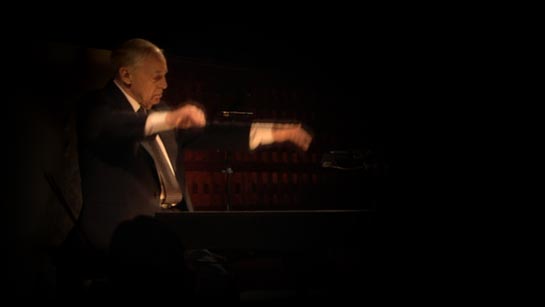
A balmy summer’s morning during the year 2001, 18th August to be precise: today is ‘spielfrei’ (no performance) and the Festspielhaus appears almost deserted, the stage is quiet, rehearsal spaces are empty, it’s even possible to find a space in the car park.
But walk through the canteen (also closed) towards the Chorsaal and you will find a throng of smartly dressed visitors milling around and a buzz of expectancy in the warm Franconian air. These guests are not hapless opera-goers who have misread the date on their highly-prized Karten, but distinguished guests from the world of opera assembled for the presentation of the Wilhelm Pitz-Preis. This price is awarded for outstanding services to opera in Germany, and almost always to someone with a close personal connection to Bayreuth, by the Union of German Opera Choruses, otherwise known as the VdO (Vereingung deutsche Opernchöre & Bühnentänzer). Named after the celebrated chorus director of ‘Neu Bayreuth’, the illustrious list of previous recipients includes Wolfgang Wagner, Götz Friedrich, and Norbert Balatsch with the Bayreuth Festspielchor.
Conductor Pierre Boulez will be awarded the prize today in a ceremony including speeches from VdO executive Stefan Meuschel and Manfred Jung (who sang the role of Siegfried in the celebrated Boulez/Chereau Jahrhundert Ring) and framed by the klangwunder of the Bayreuth Festival Chorus itself. As well as singing in most of the opera performances (only Rheingold, Die Walküre and Siegfried are ‘chorfrei’), it’s always very much been the chorus’ role to act as ambassadors for the festival, providing musical enrichment to indoor and outdoor Festspiele events. On 25th July, the day of the premiere each year, the chorus traditionally sing around Richard Wagner’s grave at 9.30am sharp (bring a brolly, it’s usually raining!).
Today the chorus give a polished rendition of the famous Schwanenchor from Lohengrin conducted by their current chorus director Eberhard Friedrich (the first chorus director in the history of the festival to have a street in Bayreuth named after him before he assumes office) but for the Wilhelm Pitz-Preis, it is also desirable to sing a piece which has a special connection to the person receiving the honour. Pierre Boulez is, of course, also a composer. Although the Bayreuth Festival Chorus is a magnificent choir in its respective repertoire, it is perhaps not so suited to the rendering of complex contemporary music, so the decision was made (a relief to all concerned) to play instead a recording of Boulez’s setting of a Malarmé poem for soprano and instrumental ensemble through a large loudspeaker erected in the Chorsaal. Everyone listens intently to the (je m’excuse , M. Boulez) intermittent squeaks, boings and plink-plonks of this piece and when the ‘music’ comes to a stop, polite applause follows – at which point, the music starts up again. An embarrassed tittering can be heard, as the audience realise their mistake in assuming the piece was over. After three or four minutes of plink plonk there is once again a long silence, followed by somewhat cautious applause. Manfred Jung, who is next to speak, steps up to the podium but as he opens his mouth to begin, more plink plonk tones suddenly emanate from the loud speaker – the piece still hasn’t finished. Jung sits down again and the mood of determination in the audience can be clearly discerned: ‘we are not going to applaud again until we definitely, definitely know that this piece is finished’. The plink plonks continue for a while until the tense silence is suddenly broken by an unmistakable voice with a strong French accent. “Jetzt dürfen Sie” (“now you can”). The whole room erupts with thunderous applause, laughter and cheers, as the only man in the room who knows when the piece is actually over tells the assembled guests that it is finally safe to applaud his composition.
After the excitement of the plink plonks, the rest of the ceremony seemed to go by in a whirl, so the diligent amongst you will be delighted to learn that you can read transcripts of all the speeches in a book about the history of the prize, “Wilhelm Pitz-Preis 1984 bis 2001”. Boulez’s long association with Bayreuth continued as conductor of Christopher Schlingensief’s controversial Parsifal. Has the performance of one of his compositions ever met with such a wildly enthusiastic reception as on that morning in August, though? I wonder. Watching the whole proceedings from a seat in the back row, Antonio Pappano, conductor of Lohengrin that year, and, who knows, a future recipient of the Wilhelm Pitz-Preis himself.

About the author
Julia Thornton first sang with the Bayreuth Festival Chorus whilst still a student at the Royal Northern College of Music in 1993 until the year 2006, when she left to concentrate on solo work. Her association with the works of Richard Wagner continues, however: she sang the role of Helmwige in Freiburg Opera’s production of Die Walküre in 2008/9 and will sing Brünnhilde in Freiburgs hip-hop opera project for young people Der Rap des Nibelungen!
Colin Bayliss • Clemens Bieber • Bea and Alec Bobotek • Stephen Charitan • Gary Campbell • Jerry Floyd • Sam Goodyear • Janette Griffiths • Diana Herbst • Hildegaard Arnold Kiel • Randall G. Malmstrom • Anne Midgette • Walter Meyer • Wouter de Moor • John F. Runciman • Per-Erik Skramstad • Brian Slater • Julia Thornton • Natalie Tsang • Mark Twain •
Mark Twain at Bayreuth
Chicago Daily Tribune, December 6, 1891
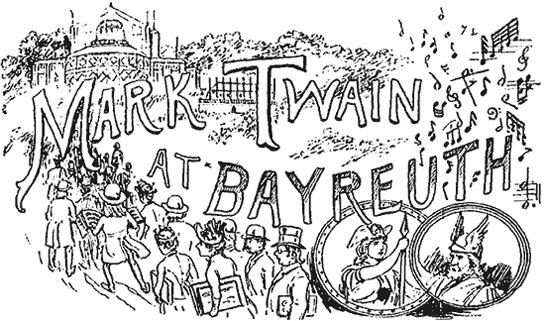
It was at Nuremberg that we struck the inundation of music-mad strangers that was rolling down upon Bayreuth. It had been long since we had seen such multitudes of excited and struggling people. It took a good half-hour to pack them and pair them into the train--and it was the longest train we have yet seen in Europe. Nuremberg had been witnessing this sort of experience a couple of times a day for about two weeks. It gives one an impressive sense of the magnitude of this biennial pilgrimage. For a pilgrimage is what it is. The devotees come from the very ends of the earth to worship their prophet in his own Kaaba in his own Mecca.
If you are living in New York or San Francisco or Chicago or anywhere else in America, and you conclude, by the middle of May, that you would like to attend the Bayreuth opera two months and a half later, you must use the cable and get about it immediately or you will get no seats, and you must cable for lodgings, too. Then if you are lucky you will get seats in the last row and lodgings in the fringe of the town. If you stop to write you will get nothing. There were plenty of people in Nuremberg when we passed through who had come on pilgrimage without first securing seats and lodgings. They had found neither in Bayreuth; they had walked Bayreuth streets a while in sorrow, then had gone to Nuremberg and found neither beds nor standing room, and had walked those quaint streets all night, waiting for the hotels to open and empty their guests into trains, and so make room for these, their defeated brethren and sisters in the faith. They had endured from thirty to forty hours' railroading on the continent of Europe--with all which that implies of worry, fatigue, and financial impoverishment--and all they had got and all they were to get for it was handiness and accuracy in kicking themselves, acquired by practice in the back streets of the two towns when other people were in bed; for back they must go over that unspeakable journey with their pious mission unfulfilled. These humiliated outcasts had the frowsy and unbrushed and apologetic look of wet cats, and their eyes were glazed with drowsiness, their bodies were adroop from crown to sole, and all kind-hearted people refrained from asking them if they had been to Bayreuth and failed to connect, as knowing they would lie.
We reached Bayreuth about mid-afternoon of a rainy Saturday. We were of the wise, and had secured lodgings and opera seats months in advance.
I am not a musical critic, and did not come here to write essays about the operas and deliver judgment upon their merits. The little children of Bayreuth could do that with a finer sympathy and a broader intelligence than I. I only care to bring four or five pilgrims to the operas, pilgrims able to appreciate them and enjoy them. What I write about the performance to put in my odd time would be offered to the public as merely a cat's view of a king, and not of didactic value.
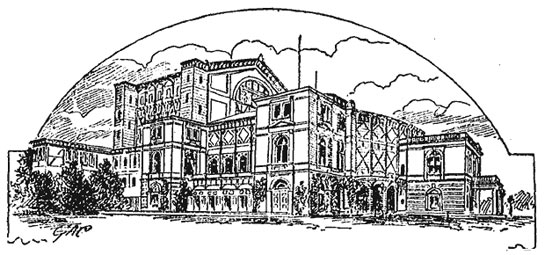
Next day, which was Sunday, we left for the opera-house--that is to say, the Wagner temple--a little after the middle of the afternoon. The great building stands all by itself, grand and lonely, on a high ground outside the town. We were warned that if we arrived after 4 o'clock we should be obliged to pay $2.50 apiece by way of fine. We saved that; and it may be remarked here that this is the only opportunity that Europe offers of saving money. There was a big crowd in the grounds about the building, and the ladies' dresses took the sun with fine effect. I do not mean to intimate that the ladies were in full dress, for that was not so. The dresses were pretty, but neither sex was in evening dress.
The interior of the building is simple--severely so; but there is no occasion for color and decoration, since the people sit in the dark. The auditorium has the shape of a keystone, with the stage at the narrow end. There is an aisle on each side, but no aisle in the body of the house. Each row of seats extends in an unbroken curve from one side of the house to the other. There are seven entrance doors on each side of the theater and four at the butt end--eighteen doors to admit and emit 1,650 persons. The number of the particular door by which you are to enter the house or leave it is printed on your ticket, and you can use no door but that one. Thus, crowding and confusion are impossible. Not so many as a hundred people use any one door. This is better than having the usual (and useless) elaborate fireproof arrangements. It is the model theater of the world. It can be emptied while the second hand of a watch makes its circuit. It would be entirely safe, even if it were built of lucifer matches.
If your seat is near the center of a row and you enter late you must work your way along a rank of about twenty-five ladies and gentlemen to get to it. Yet this causes no trouble, for everybody stands up until all the seats are full, and the filling is accomplished in a very few minutes. Then all sit down, and you have a solid mass of fifteen hundred heads, making a steep cellar-door slant from the rear of the house down to the stage.
All the lights were turned low, so low that the congregation sat in a deep and solemn gloom. The funereal rustling of dresses and the low buzz of conversation began to die swiftly down, and presently not the ghost of a sound was left. This profound and increasingly impressive stillness endured for some time--the best preparation for music, spectacle, or speech conceivable. I should think our show people would have invented or imported that simple and impressive device for securing and solidifying the attention of an audience long ago; instead of which there continue to this day to open a performance against a deadly competition in the form of noise, confusion, and a scattered interest.
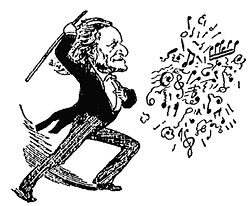
Finally, out of darkness and distance and mystery soft rich notes rose upon the stillness, and from his grave the dead magician began to weave his spells about hisdisciples and steep their souls in his enchantments. There was something strangely impressive in the fancy which kept intruding itself that the composer was conscious in his grave of what was going on here, and that these divine souls were the clothing of thoughts which were at this moment passing through his brain, and not recognized and familiar ones which had issued from it at some former time.
The entire overture, long as it was, was played to a dark house with the curtain down. It was exquisite; it was delicious. But straightway thereafter, or course, came the singing, and it does seem to me that nothing can make a Wagner opera absolutely perfect and satisfactory to the untutored but to leave out the vocal parts. I wish I could see a Wagner opera done in pantomime once. Then one would have the lovely orchestration unvexed to listen to and bathe his spirit in, and the bewildering beautiful scenery to intoxicate his eyes with, and the dumb acting couldn't mar these pleasures, because there isn't often anything in the Wagner opera that one would call by such a violent name as acting; as a rule all you would see would be a couple of silent people, one of them standing still, the other catching flies. Of course I do not really mean that he would be catching flies; I only mean that the usual operatic gestures which consist in reaching first one hand out into the air and then the other might suggest the sport I speak of if the operator attended strictly to business and uttered no sound.
This present opera was "Parsifal." Madame Wagner does not permit its representation anywhere but in Bayreuth. The first act of the three occupied two hours, and I enjoyed that in spite of the singing.
I trust that I know as well as anybody that singing is one of the most entrancing and bewitching and moving and eloquent of all the vehicles invented by man for the conveying of feeling; but it seems to me that the chief virtue in song is melody, air, tune, rhythm, or what you please to call it, and that when this feature is absent what remains is a picture with the color left out. I was not able to detect in the vocal parts of "Parsifal" anything that might with confidence be called rhythm or tune or melody; one person performed at a time--and a long time, too--often in a noble, and always in a high-toned, voice; but he only pulled out long notes, then some short ones, then another long one, then a sharp, quick, peremptory bark or two--and so on and so on; and when he was done you saw that the information which he had conveyed had not compensated for the disturbance. Not always, but pretty often. If two of them would but put in a duet occasionally and blend the voices; but no, they don't do that. The great master, who knew so well how to make a hundred instruments rejoice in unison and pour out their souls in mingled and melodious tides of delicious sound, deals only in barren solos when he puts in the vocal parts. It may be that he was deep, and only added the singing to his operas for the sake of the contrast it would make with the music. Singing! It does seem the wrong name to apply to it. Strictly described, it is a practicing of difficult and unpleasant intervals, mainly. An ignorant person gets tired of listening to gymnastic intervals in the long run, no matter how pleasant they may be. In "Parsifal" there is a hermit named Gurnemanz who stands on the stage in one spot and practices by the hour, while first one and then another character of the cast endures what he can of it and then retires to die.
During the evening there was an intermission of three-quarters of an hour after the first act and one an hour long after the second. In both instances the theater was totally emptied. People who had previously engaged tables in the one sole eating-house were able to put in their time very satisfactorily; the other thousand went hungry. The opera was concluded at ten in the evening or a little later. When we reached home we had been gone more than seven hours. Seven hours at $5 a ticket is almost too much for the money.
While browsing about the front yard among the crowd between the acts I encountered twelve or fifteen friends from different parts of America, and those of them who were most familiar with Wagner said that "Parsifal" seldom pleased at first, but that after one had heard it several times it was almost sure to become a favorite. It seemed impossible, but it was true, for the statement came from people whose word was not to be doubted.
And I gathered some further information. On the ground I found part of a German musical magazine, and in it a letter written by Uhlic thirty-three years ago, in which he defends the scorned and abused Wagner against people like me, who found fault with the comprehensive absence of what our kind regards as singing. Uhlic says Wagner despised "jene plapperude musik," and therefore "runs, trills, and schnörkel are discarded by him." I don't know what a schnörkel is, but now that I know it has been left out of these operas I never have missed so much in my life. And Uhlic further says that Wagner's song is true: that it is "simply emphasized intoned speech." That certainly describes it--in "Parsifal" and some of the operas; and if I understand Uhlic's elaborate German he apologizes for the beautiful airs in "Tannhäuser." Very well; now that Wagner and I understand each other, perhaps we shall get along better, and I shall stop calling him Waggner, on the American plan, and hereafter call him Voggner as per German custom, for I feel entirely friendly now. The minute we get reconciled to a person, how willing we are to throw aside little needless punctilios and pronounce his name right!
Of course I came home wondering why people should come from all corners of America to hear these operas, when we have lately had a season or two of them in New York with these same singers in the several parts, and possibly this same orchestra. I resolved to think that out at all hazards.
Tuesday.--Yesterday they played the only operatic favorite I have ever had--an opera which has always driven me mad with ignorant delight whenever I have heard it--"Tannhäuser." I heard it first when I was a youth; I heard it last in the last German season in New York. I was busy yesterday and I did not intend to go, knowing I should have another "Tannhäuser" opportunity in a few days; but after five o'clock I found myself free and walked out to the opera-house and arrived about the beginning of the second act. My opera ticket admitted me to the grounds in front, past the policeman and the chain, and I thought I would take a rest on a bench for an hour or two and wait for the third act.
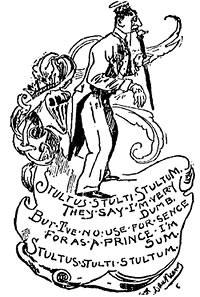
In a moment or so the first bugles blew, and the multitude began to crumble apart and melt into the theater. I will explain that this bugle-call is one of the pretty features here. You see,the theater is empty, and hundreds of the audience are a good way off in the feeding-house; the first bugle-call is blown about a quarter of an hour before time for the curtain to rise. This company of buglers, in uniform, march out with military step and send out over the landscape a few bars of the theme of the approaching act, piercing the distances with the gracious notes; then they march to the other entrance and repeat. Presently they do this over again. Yesterday only about 200 people were still left in front of the house when the second call was blown; in another half-minute they would have been in the house, but then a thing happened which delayed them--the only solitary thing in this world which could be relied on with certainty to accomplish it, I suppose--an Imperial Princess appeared in the balcony above them. They stopped dead in their tracks and began to gaze in a stupor of gratitude and satisfaction. The lady presently saw that she must disappear or the doors would be closed upon these worshipers, so she returned to her box. This daughter-in-law of an Emperor was pretty; she had a kind face; she was without airs; she is known to be full of common human sympathies. There are many kinds of Princes, but this kind is the most harmful of all, for wherever they go they reconcile people to monarchy and set back the clock of progress. The valuable Princes, the desirable Princes, are the Czars and their sort. By their mere dumb presence in the world they cover with derision every argument that can be invented in favor of royalty by the most ingenious casuist. In his time the husband of this Princess was valuable. He led a degraded life, he ended it with his own hand in circumstances and surroundings of a hideous sort, and was buried like a god.
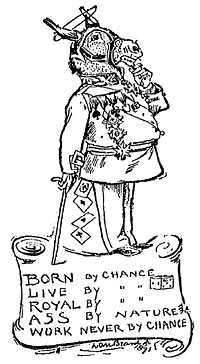
In the opera-house there is a long loft back of the audience, a kind of open gallery, in which Princes are displayed. It is sacred to them; it is the holy of holies. As soon as the filling of the house is about complete the standing multitude turn and fix their eyes upon the princely layout and gaze mutely and longingly and adoringly and regretfully like sinners looking into heaven. They become rapt, unconscious, steeped in worship. There is no spectacle anywhere that is more pathetic than this. It is worth crossing many oceans to see. It is somehow not the same gaze that people rivet upon a Victor Hugo, or Niagara, or the bones of the mastodon, or the guillotine of the revolution, or the great pyramid, or distant Vesuvius smoking in the sky, or any man long celebrated to you by his genius and achievements, or thing long celebrated to you by the praises of books and pictures--no, that gaze is only the gaze of intense curiosity, interest, wonder, engaged in drinking delicious deep draughts that taste good all the way down and appease and satisfy the thirst of a lifetime. Satisfy it--that is the word. Hugo and the mastodon will still have a degree of intense interest thereafter when encountered, but never anything approaching the ecstasy of that first view. The interest of a Prince is different. It may be envy, it may be worship, doubtless it is a mixture of both--and it does not satisfy its thirst with one view, or even noticeably diminish it. Perhaps the essence of the thing is the value which men attach to a valuable something which has come by luck and not been earned. A dollar picked up in the road is more satisfaction to you than the ninety and nine which you had to work for, and money won at faro or in stocks snuggles into your heart in the same way. A Prince picks up grandeur, power, and a permanent holiday and gratis support by a pure accident, the accident of birth, and he stands always before the grieved eye of poverty and obscurity a monumental representative of luck. And then--supremest value of all--his is the only high fortune on the earth which is secure. The commercial millionaire may become a beggar; the illustrious statesman can make a vital mistake and be dropped and forgotten; the illustrious general can lose a decisive battle and with it the consideration of men; but once a Prince always a Prince--that is to say, an imitation god, and neither hard fortune nor an infamous character nor an addled brain nor the speech of an ass can undeify him. By common consent of all the nations and all the ages the most valuable thing in this world is the homage of men, whether deserved or undeserved. It follows without doubt or question, then, that the most desirable position possible is that of a Prince. And I think it also follows that the so-called usurpations with which history is littered are the most excusable misdemeanors which men have committed. To usurp a usurpation--that is all it amounts to, isn't it?
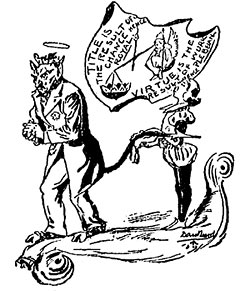
A Prince is not to us what he is to a European, of course. We have not been taught to regard him as a god, and so one good look at him is likely to so nearly appease our curiosity as to make him an object of no greater interest the next time. We want a fresh one. But it is not so with the European. I am quite sure of it. The same old one will answer; he never stales. Eighteen years ago I was in London and I called at an Englishman's house on a bleak and foggy and dismal December afternoon to visit his wife and married daughter by appointment. I waited half an hour and then they arrived, frozen. They explained that they had been delayed by an unlooked-for circumstance: while passing in the neighborhood of Marlborough House they saw a crowd gathering and were told that the Prince of Wales was about to drive out, so they stopped to get a sight of him. They had waited half an hour on the sidewalk, freezing with the crowd, but were disappointed at last--the Prince had changed his mind. I said, with a good deal of surprise:
"Is it possible that you two have lived in London all your lives and have never seen the Prince of Wales?"
Apparently it was their turn to be surprised, for they exclaimed:
"What an idea! Why, we have seen him hundreds of times."
They had seem him hundreds of times, yet they had waited half an hour in the gloom and the bitter cold, in the midst of a jam of patients from the same asylum, on the chance of seeing him again. It was a stupefying statement, but one is obliged to believe the English, even when they say a thing like that. I fumbled around for a remark, and got out this one:
"I can't understand it at all. If I had never seen General Grant I doubt if I would do that even to get a sight of him," with a slight emphasis on the last word.
Their blank faces showed that they wondered where the parallel came in. Then they said, blankly:
"Of course not. He is only a President."
It is doubtless a fact that a Prince is a permanent interest, an interest not subject to deterioration. The general who was never defeated, the general who never held a council of war, the only general who ever commanded a connected battle-front 1,200 miles long, the smith who welded together the broken parts of a great republic and re-established it where it is quite likely to outlast all the monarchies present and to come, was really a person of no serious consequence to these people. To them, with their training, my General was only a man, after all, while their Prince was clearly much more than that--a being of a wholly unsimilar construction and constitution, and being of no more blood and kinship with men than are the serene eternal lights of the firmament with the poor dull tallow candles of commerce that sputter and die and leave nothing behind but a pinch of ashes and a stink.
I saw the last act of "Tannhäuser." I sat in the gloom and the deep stillness, waiting--one minute, two minutes, I do not know exactly how long--then the soft music of the hidden orchestra began to breathe its rich, long sighs out from under the distant stage, and by and by the drop-curtain parted in the middle and was drawn softly aside, disclosing the twilighted wood and a wayside shrine, with a white-robed girl praying and a man standing near. Presently that noble chorus of men's voices was heard approaching, and from that moment until the closing of the curtain it was music, just music--music to make one drunk with pleasure, music to make one take scrip and staff and beg his way round the globe to hear it.
To such as are intending to come here in the Wagner season next year I wish to say, bring your dinner-pail with you. If you do, you will never cease to be thankful. If you do not, you will find it a hard fight to save yourself from famishing in Bayreuth. Bayreuth is merely a large village, and has no very large hotels or eating-houses. The principal inns are the Golden Anchor and the Sun. At either of these places you can get an excellent meal--no, I mean you can go there and see other people get it. There is no charge for this. The town is littered with restaurants, but they are small and bad, and they are overdriven with custom. You must secure a table hours beforehand, and often when you arrive you will find somebody occupying it. We have had this experience. We have had a daily scramble for life; and when I say we, I include shoals of people. I have the impression that the only people who do not have to scramble are the veterans-the disciples who have been here before and know the ropes. I think they arrive about a week before the first opera, and engage all the tables for the season. My tribe had tried all kinds of places--some outside of the town, a mile or two--and have captured only nibblings and odds and ends, never in any instance a complete and satisfying meal. Digestible? No, the reverse. These odds and ends are going to serve as souvenirs of Bayreuth, and in that regard their value is not to be overestimated. Photographs fade, bric-a-brac gets lost, busts of Wagner get broken, but once you absorb a Bayreuth restaurant meal it is your possession and your property until the time comes to embalm the rest of you. Some of these pilgrims here become, in effect, cabinets; cabinets of souvenirs of Bayreuth. It is believed among scientists that you could examine the crop of a dead Bayreuth pilgrim anywhere in the earth and tell where he came from. But I like this ballast. I think a "Hermitage" scrape-up at 8 in the evening, when all the famine-breeders have been there and laid in their mementoes and gone, is the quietest thing you can lay on your keelson except gravel.
Thursday. -- They keep two teams of singers in stock for the chief roles, and one of these is composed of the most renowned artists in the world, with Materna and Alvary in the lead. I suppose a double team is necessary; doubtless a single team would die of exhaustion in a week, for all the plays last from 4 in the afternoon till 10 at night. Nearly all the labor falls upon the half dozen head singers, and apparently they are required to furnish all the noise they can for the money. If they feel a soft, whispery, mysterious feeling they are required to open out and let the public know it. Operas are given only on Sundays, Mondays, Wednesdays, and Thursdays, with three days of ostensible rest per week, and two teams to do the four operas; but the ostensible rest is devoted largely to rehearsing. It is said that the off days are devoted to rehearsing from some time in the morning till 10 at night. Are there two orchestras also? It is quite likely, since there are a hundred and ten names in the orchestra list.
Yesterday the opera was "Tristan and Isolde." I have seen all sorts of audiences--at theaters, operas, concerts, lectures, sermons, funerals--but none which was twin to the Wagner audience of Bayreuth for fixed and reverential attention, absolute attention and petrified retention to the end of an act of the attitude assumed at the beginning of it. You detect no movement in the solid mass of heads and shoulders. You seem to sit with the dead in the gloom of a tomb. You know that they are being stirred to their profoundest depths; that there are times when they want to rise and wave handkerchiefs and shout their approbation, and times when tears are running down their faces, and it would be a relief to free their pent emotions in sobs or screams; yet you hear not one utterance till the curtain swings together and the closing strains have slowly faded out and died; then the dead rise with one impulse and shake the building with their applause. Every seat is full in the first act; there is not a vacant one in the last. If a man would be conspicuous, let him come here and retire from the house in the midst of an act. It would make him celebrated.
This audience reminds me of nothing I have ever seen and of nothing I have read about except the city in the Arabian tale where all the inhabitants have been turned to brass and the traveler finds them after centuries mute, motionless, and still retaining the attitudes which they last knew in life. Here the Wagner audience dress as they please, and sit in the dark and worship in silence. At the Metropolitan in New York they sit in a glare, and wear their showiest harness; they hum airs, they squeak fans, they titter, and they gabble all the time. In some of the boxes the conversation and laughter are so loud as to divide the attention of the house with the stage. In large measure the Metropolitan is a show-case for rich fashionables who are not trained in Wagnerian music and have no reverence for it, but who like to promote art and show their clothes.
Can that be an agreeable atmosphere to persons in whom this music produces a sort of divine ecstasy and to whom its creator is a very deity, his stage a temple, the works of his brain and hands consecrated things, and the partaking of them with eye and ear a sacred solemnity? Manifestly, no. Then, perhaps the temporary expatriation, the tedious traversing of seas and continents, the pilgrimage to Bayreuth stands explained. These devotees would worship in an atmosphere of devotion. It is only here that they can find it without fleck or blemish or any worldly pollution. In this remote village there are no sights to see, there is no newspaper to intrude the worries of the distant world, there is nothing going on, it is always Sunday. The pilgrim wends to his temple out of town, sits out his moving service, returns to his bed with his heart and soul and his body exhausted by long hours of tremendous emotion, and he is in no fit condition to do anything but to lie torpid and slowly gather back life and strength for the next service. This opera of "Tristan and Isolde" last night broke the hearts of all witnesses who were of the faith, and I know of some who have heard of many who could not sleep after it, but cried the night away. I feel strongly out of place here. Sometimes I feel like the sane person in a community of the mad; sometimes I feel like the one blind man where all others see; the one groping savage in the college of the learned, and always, during service, I feel like a heretic in heaven.
But by no means do I ever overlook or minify the fact that this is one of the most extraordinary experiences of my life. I have never seen anything like this before. I have never seen anything so great and fine and real as this devotion.
Friday.--Yesterday's opera was "Parsifal" again. The others went and they show marked advance in appreciation; but I went hunting for relics and reminders of the Margravine Wilhelmina, she of the imperishable "Memoirs." I am properly grateful to her for her (unconscious) satire upon monarchy and nobility, and therefore nothing which her hand touched or her eye looked upon is indifferent to me. I am her pilgrim; the rest of this multitude here are Wagner's.
Tuesday.--I have seen my last two operas; my season is ended, and we cross over into Bohemia this afternoon. I was supposing that my musical regeneration was accomplished and perfected, because I enjoyed both of these operas, singing and all, and, moreover, one of them was "Parsifal," but the experts have disenchanted me. They say:
"Singing! That wasn't singing; that was the wailing, screeching of third-rate obscurities, palmed off on us in the interest of economy."
Well, I ought to have recognized the sign--the old, sure sign that has never failed me in matters of art. Whenever I enjoy anything in art it means that it is mighty poor. The private knowledge of this fact has saved me from going to pieces with enthusiasm in front of many and many a chromo. However, my base instinct does bring me profit sometimes; I was the only man out of 3,200 who got his money back on those two operas.
This travel letter was published in Chicago Daily Tribune, December 6, 1891, and is often retitled "At the Shrine of St. Wagner"
Mark Twain is Samuel Langhorne Clemens' pen name
Mark Twain resources
Colin Bayliss • Clemens Bieber • Bea and Alec Bobotek • Stephen Charitan • Gary Campbell • Jerry Floyd • Sam Goodyear • Janette Griffiths • Diana Herbst • Hildegaard Arnold Kiel • Randall G. Malmstrom • Anne Midgette • Walter Meyer • Wouter de Moor • John F. Runciman • Per-Erik Skramstad • Brian Slater • Julia Thornton • Natalie Tsang • Mark Twain •
My Bayreuth Adventure 2014
It was with great excitement that I boarded a boat for a cruise down the Rhine during my summer holidays this year – not only did this promise a day of visits to amazing fairy-tale castles, it was also my prelude to an even bigger adventure to come, my first Ring Cycle at the Bayreuth Festival 2014. When my parents told me they got tickets for the Bayreuth Festival this year, I felt it would be a good idea to do some preparations beforehand. I spent some time reading the synopsis and translation of the libretto as well as listening to recordings, but nothing could quite prepare me for watching the entire Ring Cycle in one go.
To complete my preparations for the Ring, I went on a boat cruise down the Rhine. As the boat went past the Lorelei with its dramatically steep rocks, I could imagine Siegfried travelling down the Rhine looking for enemies to fight and battles to win. The darkly wooded hills might be Fafner’s natural habitat! The Rhine is home to many small towns such as Bacharach and St. Goar which have small antique shops and wineries. Many of these historic old towns are protected by castles as hundreds of years ago, the Rhine was a dangerous and treacherous place. Now, there are many visitors on cruise boats touring the Rhine as it is a popular destination known for its wines and castles. My favourite castle is the Pfalz, which was built on an island in the middle of the Rhine in the shape of a ship. It was used as a toll castle to collect fares from passing boats. There are also grand castles like Burg Rheinfels, which could have been a worthy home for the Gibichungs.
A few days after my journey down the Rhine, I watched a very different Rhine journey at Bayreuth’s Festspielhaus. The Ring Cycle came as a complete surprise - I was expecting to see the Gods in flowing robes and the Walkures in winged helmets but instead they wore unremarkable suits and dresses. In Das Rheingold, the Gods were sinister gangsters; Fafner was killed by Siegfried’s machine gun rather than Notung. The sets were equally surprising. The Rhine was transformed into a swimming pool, in a motel on Route 66 in Texas. The palace of the Gibichungs was a chemical plant with a kebab van parked outside, serving some rather unappetising food with lots of ketchup and mustard.
This year’s Bayreuth production was directed by Frank Castorf. He interpreted the Ring as a story of how the quest for oil led to greed, killing and destruction. The production was at times a sensory overload as there was a lot of video art which was only sometimes effective. The stage was very busy. Castorf put his assistant director in as an extra man on set, appearing as a bartender in Das Rheingold, a bear at the beginning of Siegfried and an old lady pushing a pram with potatoes tumbling out in Götterdammerung. The Festspielhaus’ productions are known to be surprising and are meant to shock the audience. I was not too sure about this production though as there were too many distractions which included the song bird being eaten by an alligator at the end of Siegfried! However, I enjoyed the music in a hall with such unique and wonderful acoustics. I particularly enjoyed Sieglinde (Anja Kampe) and Siegmund’s (Johan Botha) performances and also Brünnhilde’s (Catherine Foster) singing.
What were my memorable moments? I thought the scene when Siegmund died was particularly touching. By using video art, Siegmund was portrayed as recognising that his father, Wotan was behind his killing which made me feel very sorry for him. Siegfried’s journey down the Rhine was also effective in representing Siegfried’s venture into the world. Castorf depicted Siegfried asleep on a bench in his transition to a different phase of his life. He was curled up like a baby, a symbol of his journey from a boy of the wild forests to a man entering the civilised world. The setting of this scene was quite simple, with a video recording showing Siegfried tossing and turning in his sleep. This relatively calm scene really drew my attention to the music and helped me concentrate and listen to it without distraction. Sadly, Siegfried’s journey did not end well as he was tricked and killed by Hagen, unlike my amazing journey down the Rhine which led me to my first Ring Cycle.
The Festspielhaus itself was also fascinating. People dressed formally in black ties or other evening wear, even more elegantly than the singers on stage. The start of the performance was announced by a brass ensemble which stood on the balcony and played a short extract from the opera. Many people gathered to hear this, including a few who did not have tickets to the performance. The seats were quite narrow and hard so many people brought along cushions to sit on. As there was not much space, people had to stand to make sure everyone in the row had arrived before sitting down. The orchestra was completely hidden from view in the pit, thus making it easier for the singers to project their voices over the orchestra. During the intervals, most people either grabbed some food or wandered round the gardens. The grounds were very beautiful in the summer; the flowers in bloom making the gardens very colourful. The Bayreuth audience was quite different from those in other opera houses I had been to - normally when singers took curtain calls, everyone clapped whether they sang well or not. However, at Bayreuth, the audience did not hesitate to boo very loudly if they disapproved! It must have been very scary for the singers.
The town of Bayreuth, normally a quiet town, was bustling with people when we were there. The townspeople were very welcoming. There were many attractions in this small town but the day was quite short for sight-seeing as the opera started very early in the afternoon. In our free time, my family and I visited small, antique bookshops and restaurants serving delicious schnitzels and frankfurters. One of my favourite places in Bayreuth was the Steingraeber piano museum where I had the chance to try out a piano owned by Liszt and some antique pianos from the 1800’s in the family’s beautiful music hall, where concerts are still held today. There were also various models of the Parsifal bell on display, the original was melted down during World War II as munitions. During our visit, Wagner’s house Wahnfried was closed for refurbishment but we visited Liszt’s house instead.
My Bayreuth experience was truly extraordinary. My parents told me that the waiting time for tickets was seven years for them, not unlike the Flying Dutchman who went ashore every seven years! If I start applying for tickets now, I can hope to get my own tickets in seven years’ time when I am 19. I would love to go to Bayreuth again - I hope your Bayreuth experience will also be memorable.
Colin Bayliss • Clemens Bieber • Bea and Alec Bobotek • Stephen Charitan • Gary Campbell • Jerry Floyd • Sam Goodyear • Janette Griffiths • Diana Herbst • Hildegaard Arnold Kiel • Randall G. Malmstrom • Anne Midgette • Walter Meyer • Wouter de Moor • John F. Runciman • Per-Erik Skramstad • Brian Slater • Julia Thornton • Natalie Tsang • Mark Twain •
From Pilgrim to Professional
At the time of writing, I have had the pleasure of attending the Bayreuth Festival three times: In 1990, 1997 and 2008.
1990
Seven years I had waited for a ticket when I in 1990 got tickets for the Kupfer Ring.
At that time I had very little idea about what was to be expected from the Kupfer Ring. My interest for "modern" interpretations was slowly awakened when I saw Norwegian director Stein Winge's awesome production of Hamlet in Oslo with Bjørn Sundquist in the title role. Having seen this I remember thinking that there's no way back to the lame traditional productions with little or no stage directing.
And Harry Kupfer confirmed this with a Ring I today rank among the very best of Wagner productions.
Apart from Kupfer's rich and illuminating directing of the singers, three singers made an enormous impact on me: John Tomlinson (Wotan), Anne Evans (Brünnhilde) and Graham Clark (Loge and Mime).
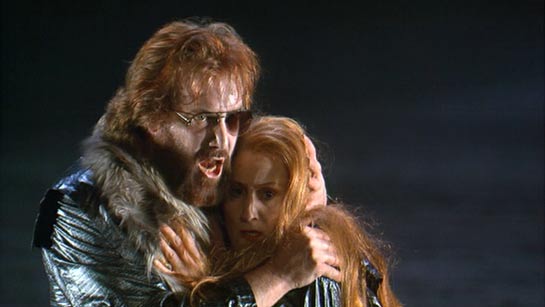
John Tomlinson and Anne Evans in Harry Kupfer's production of Die Walküre.
John Tomlinson's portrayal of Wotan with an emotional register I had never seen before in any singer actor, or later. Tomlinson's Wotan is in my opinion one of the great post-war achievements at Bayreuth. And then there was Anne Evans's tender and lyrical Brünnhilde, without the vibrato one unfortunately expects from a dramatic soprano. And lastly Graham Clark's hilarious Loge and Mime. I feel so lucky that I later have had the chance to interview these great artists and icons.
1997
In 1997 I returned to the scene of the crime, this time as an assistant journalist to my friend Erling E. Guldbrandsen. The Bayreuth Festival summer of 1997 was totally crazy, and today I have no idea how we got the energy to interview Wolfgang Wagner, John Tomlinson, Poul Elming, Rosalie and Alfred Kirchner and attending the Kirchner / Rosalie Ring, Wolfgang Wagner's Meistersinger and Heiner Müller's Tristan.
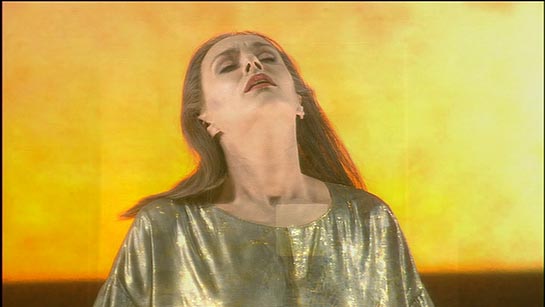
Although I had experienced Waltraud Meier as a great Waltraute in Harry Kupfer's Götterdämmerung, now experiencing her as Isolde was a truly shattering experience. Twelve years later I have still not recovered from this Tristan performance.
2008
In 2008 I returned to see Stefan Herheim's Parsifal, Katharina Wagner's Meistersinger and Tancred Dorst's Ring.
![]()
Thomas Jesatko as Klingsor in Stefan Herheim's production of Parsifal. Photo from 2009: Enrico Nawrath
Parsifal and Meistersinger have been covered here on Wagneropera.net; the Dorst Ring is best forgotten, except for one thing: Christian Thielemann's outstanding conducting. There was, of course, some great achievements from the singers, but as music theatre this is a sad chapter in the history of Bayreuth. A highlight from this summer was meeting and interviewing Isolde herself, Iréne Theorin, and the lovely Penelope Turing, author of New Bayreuth.
Colin Bayliss • Clemens Bieber • Bea and Alec Bobotek • Stephen Charitan • Gary Campbell • Jerry Floyd • Sam Goodyear • Janette Griffiths • Diana Herbst • Hildegaard Arnold Kiel • Randall G. Malmstrom • Anne Midgette • Walter Meyer • Wouter de Moor • John F. Runciman • Per-Erik Skramstad • Brian Slater • Julia Thornton • Natalie Tsang • Mark Twain •
Randall G. Malmstrom: My Bayreuth Experiences
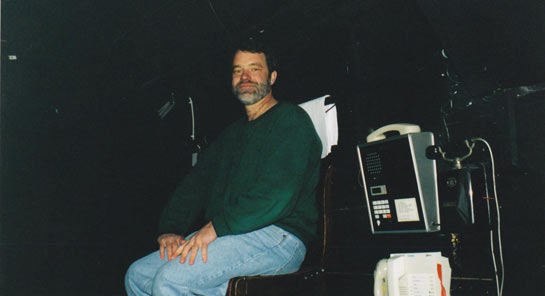
Randall G. Malmstrom in the orchestra pit in 1999.
I have been a student of Wagner’s music all my adult life. One of my first memories of definitive contact with his music was during the 1969 moon landing during which CBS television used the “Liebestod” as the accompanying music and my father asked me to identify it (I was wrong in guessing it was a Mendelssohn “Song Without Words” – ironic though!). Since that time I became ever more immersed in the beauty of the music and the tragedy of the man and the legacy left by the historical record of him and his music. I have been especially taken by his late work and by far most interested in the “Ring.”
I began planning my pilgrimage to the Bayreuth Festival as early as 1990 but did not purse the 10-year ticket ordering ordeal at that time. But in 1999 I made my first trip to Germany which included of course a visit to the Bayreuth Festival, which was closed during the off-season and as a result was able to take a German-language tour of the theatre which included a sneak preview of the “Lohengrin” sets being prepared onstage (my self-timer photo of me in front of the Königsbau, as well as a photo taken of me at the maestro’s desk in the “mystic abyss” are included here).
I began the 10-year wait for tickets, diligently re-ordering every year, and finally 2011 was the year to go – but of course no “Ring” that year! I obtained 2 tickets for my partner and I (mid-theatre) to Parsifal, Tristan and Meistersinger – in that order, and what an order! Hearing the Parsifal prelude as the first notes from that place was incredible and of course I was in tears from the first note.
The acoustics, so well documented in print by so many, simply cannot be adequately described but rather have to be experienced. And no recording can properly do justice regardless of how well done. And there have been various theories as to how to get the most accurate recording – everything from 1 or 2 microphones to a battery of them. Just consider the description given in an interval during the 1983 Solti/Bayreuth “Ring” broadcast via WFMT radio in which a general history of recording technology at the theatre is given as well as a listing of all the various microphones used for that production (I provided the audio clip on YouTube)!
In addition to the 3 productions we saw and heard from great seats in the theatre (and one could write on and on about the various pluses and minuses about the productions – especially Katharina’s very distracting “Meistersinger”), we had the quite singular opportunity to obtain tickets to sit in the mystic abyss (orchestra pit) for “Lohengrin.” Absolutely incredible! One hears about how hot and loud it is in the pit, but as a pit musician myself I loved it. Of course the pit is huge and magnificent – and actually felt cooler than the theatre those hot August days. And the orchestra – such a glorious, passionate, technically great and musical sound as exists nowhere else (and I have heard and played in a lot). (I have included photos of me with my pit ticket (complete with pit dress of shorts, t-shirt and sandals!), sitting in the pit, as well as my partner and I out front of the Königsbau.)
The top of my “bucket list” includes a return to Bayreuth to hear the “Ring” of course! In the mean time there is Seattle not far away (I played trombone in the wonderful 1985 Seattle “Walküre” conducted by Armin Jordan – great experience and one time that I did not mind sitting behind the French horn section as they were splendid!)
Regards from a former Portland Opera pit musician!
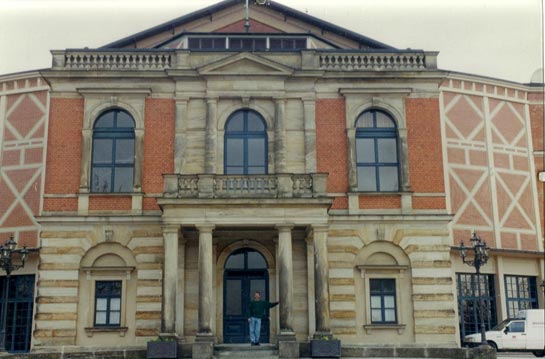
Colin Bayliss • Clemens Bieber • Bea and Alec Bobotek • Stephen Charitan • Gary Campbell • Jerry Floyd • Sam Goodyear • Janette Griffiths • Diana Herbst • Hildegaard Arnold Kiel • Randall G. Malmstrom • Anne Midgette • Walter Meyer • Wouter de Moor • John F. Runciman • Per-Erik Skramstad • Brian Slater • Julia Thornton • Natalie Tsang • Mark Twain •
2009: Meistersinger, Parsifal and Tristan
I have just returned from attendance at the last three Bayreuth performances of the season (Meistersinger, Parsifal and Tristan, for which I had lucked into tickets from the Wagner Society of Dallas this May.
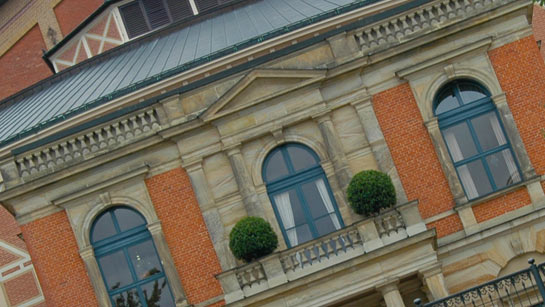
Twelve years ago, one summer, I walked 195 miles in two weeks across England. During the next few years I successfully participated in the Dutch 4daagse (4 days' walk) of 30 km each day (one year, actually walking 40 km although not required at my age even then) and on none of these occasions was I as exhausted as after attending each of these operas . Each opera started at 4 in the afternoon and had two intermissions during which one could get nourishment from the Festspielhaus' cafeteria or, with advance reservations, in its restaurant. (I never ate in the restaurant.) All the lies you may have heard about the seating in the opera are true. This was not the jewel box in which I heard Verdi's Macbeth when I was in Dresden last year. The, unpadded, seats are like the hinged seats some of us may remember from our elementary school days and not much bigger if at all. They have no arm rests. I was told that the seats were left unpadded so as not to spoil the accoustics, which didn't seem to make sense to me as I should think that people seated in them would have the same effect on the accoustics as would padding. Cushions could be obtained at no cost from the cloakroom attendants but did not really make the seats more comfortable. I had a seventh row seat the first evening and fifth row seats for the remaining two. The stage, moreover, has to be seen to be believed. It seems almost as large as the hall itself, seemingly able to contain the whole world w/in its frame.
With this introduction, let me back up a bit. Since my boyhood, i.e. from about the time I was eight or nine, I have been a Wagner fan as a result of my fascination with mythology, German and Norse as well as classical Greek. From the Ring I went on to his other operas and today, the three I was able to attend are perhaps my favorites. It was therefore a thrill and too good an opportunity to pass up to be able to obtain tickets for each of them at Wagner's spiritual and final home on such short notice. Because much of what I've already written here and much that I may be adding, may seem to reflect negativity, let me state here and now that I am glad I availed myself of this opportunity and that, knowing what I know now, I would seek those tickets again. But I'm not sure I'd do a second time what, forewarned, I would be willing to do again for a first time. (I hope this didn't sound confusing.)
The trip to Bayreuth was probably a rather pleasant one in the days of more leisurely travel. One took a summer transatlantic steamer, luxuriated on the ship, took a train upon arrival on the continent and after maybe ten days' travel time arrived at one's destination. Today, you arrive at an eastern US airport three hours before departure time to get through check-in and security for an eight-hour flight through the night to Munich. Munich airport, like the other German airports I've used, is a passenger's nightmare apparently designed by architects with post-graduate degrees in chicanery. On arrival, we had to go through passport control, which was a good fraction of a mile, if not further, from the arrival gate, after which we had to go through security for our connecting flight (one security check isn't enough here!) after which we went to the departure gate for the connecting flight to Nuremberg, which was about as far away again as the arrival gate had been. The various gates aren't necessarily on the same level and there often were no working lifts or escalators. With two pieces of luggage, neither of which was light, these hikes after an all-night flight, were tough on an old codger like me. The plane to Nuremberg looked like a WWI vintage machine with two 6-bladed propellers which was boarded, not through a covered "jetway", but, again after taking stairs, and an extended standing room bus trip, from the air field itself. In Nurenberg I had to take a cab to the train station, where I had to buy a ticket to Bayreuth, the track for which was at the far end of the station, reachable only by another long set of stairs (again with two pcs of luggage!) In Bayreuth, I had to take a cab to Bindlach, the next town over to my (Best Western) Hotel, where I crashed, coming down only for supper and breakfast, until I took their shuttle bus to the opera the next afternoon. In short, while the trip from Virginia to Bayreuth may now be faster than it was a few decades ago, the obstacles with which it's strewn seem to make it as much of a burdened pilgrimage as it may ever have been.
And now to the operas. To a non-maven like me, the music was lovely, the orchestra and singers all superb. Unfortunately all of the three operas, each one a little less so, I believe, than its predecessor, was an example of what I believe is what in Germany the over-popular *Regietheater* which IMO rarely adds much of anything valuable to the underlying work of art. Here I thought it was painting the lily almost to the point of distortion. What we were attending was, in the case of Meistersinger and probably Parsifal as well even farther removed from the originals than Carmen Jones was from Bizet's Carmen.
Die Meistersinger von Nürnberg
The worst of these, again IMO, was Meistersinger which apparently was booed at the end of each performance throughout the season, including the one I attended. One can at best admire Katharina Wagner's guts at nevertheless coming out for curtain calls as the performance's producer and facing the audience at each of these evenings. (For a description of the work's production, see Playbillarts.com , but see also Mostly Opera.)
![]()
Die Meistersinger von Nürnberg, Act 3, in Katharina Wagner's Bayreuth production. Photo taken 2009: Enrico Nawrath
I guess I can say that the performance came closer to Meistersinger than to any other opera I've attended. Perhaps it was to Meistersinger what Forbidden Planet was to The Tempest. Walter von Stolzing, sung wonderfully by Klaus Florian Vogt, first appears as a rebel without a cause, whitewashing all the artwork in the hall where the singers all meet and Hans Sachs, the shoemaker, is the only character who goes about the stage barefoot. Beckmesser, whom I always pictured as a middleaged plodder long past any realistic hopes of winning the love and affection of a girl like Eva, is here a brash young know-it all-who later sports a T-shirt with the motto, "Beck in Town", which means even less in German than in English. The guild membership test, which is normally sung to the accompaniment of Beckmesser's pounding out the mistakes as Stolzing makes them, using up the paper before the poor guy can even finish his song, becomes a speed contest in completing a jigsaw puzzle. (Don't ask!) When Sachs later turns the tables on Beckmesser by pounding on a shoe he's finishing to mark Beckmesser's mistakes, finishing the shoe before Beckmesser finishes his attempt at a song, the shoe is here replaced by a typewriter. Someone remarked, why doesn't he just use a laptop? Similarly lost in this way is how Sachs in the original breaks up an elopement plan between Walther and Eva by hammering on a shoe. The final act was for me the final disappointment. Gone was the pageantry and spendor of the Johannestag celebrations, the dance of the apprentices, the pomp and ceremony of the arrival of the Meistersinger, all substituted with historical caricatures many of which I couldn't recognize; Beckmesser, after being humiliated apparently, Shylock-like becomes the "Jew-turned-Christian" and renounces his old pedantic ways and when Walther is awarded the prize of a giant check in the amount of 10,000 Euro drawn on the Bank of Nuremberg, he spurns it and membership into the guild. In the opera as I recall, Sachs successfully convinces him to relent. I didn't see that here. Alan Titus sang Hans Sachs, Klaus Florian Vogt sang Walther, Michaela Kaune sang Eva, Adrian Eröd sang Beckmesser and Sebastian Weigle conducted.
Parsifal
Parsifal was the next performance. It's an opera with which I haven't been as familiar as with others, not really appreciating it until I attended a performance of it with the National Opera at Washington's Kennedy Center, about nine years ago. The only other performance I had attended was about 50 years ago, although I've listened to recordings in the meantime.
![]()
In this performance the curtain rose revealing what was apparently the pantomimed deathbed scene of Parsifal's mother in what I understand was one of the rooms of the Villa Wahnfried, where Wagner lived for a while and where he is buried (with his wife and, to one side, his dog). The little boy Parsifal clings to his nanny and is at first afraid to approach his dying mother, preferring to ride his rocking horse (reminding me of nothing so much as the boy in D.H. Lawrence's The Rocking Horse Winner Indeed, IMO, Parsifal's growth seems to be, at least at first from Rocking Horse Winner to Lenny in Of Mice and Men, but let that pass.) The scene changes as the Prelude ends and we see a host of men in suits with gigantic wings growing out of their backs. I guess they were supposed to represent angels. The opera doesn't normally contain angels. I don't like seeing creatures in human shape with wings coming out of their backs. They never fly anyway; they put me off, and how do they get their coats off?
The action got more and more confusing with what seemed to me to be hints of mother-son incest on the death bed but I guess it was all right because all of a sudden we're back to the little boy on the bed alone with the winged creatures gone. Maybe it was all a dream. Or was it? There's a scene of the grail knights who aren't really grail knights, rituals and a dead swan shot by young Parsifal, who doesn't have a clue.
![]()
Thomas Jesatko as Klingsor.
The second act in Klingsor's garden was also not at all what was to be expected, Klingsor losing, at least for me, some of his frightfulness when appearing in panties with women's hose held up by garters. (J. Edgar Hoover?) Lots of stuff happen before the confrontation between Klingsor and Parsifal in which Kundry seems to alternate between mom and mistress. Then a host of silent citizens fill up the stage dressed in the shabby fashions of people in the 30s and 40s who had seen better days and their bundled up children, much like assemblage of the doomed in the city squares before the Nazi deportations. In fact, that's exactly what it was because soon there were uniformed men with swastika arm bands goose-stepping over the stage shooting their victims against the backdrop of more swastika banners before the appearance of Klingsor as a half-dressed transvestite is subdued as his spear is intercepted in flight by the apparently ordained Parsifal, at which the entire scenery collapses with the end of the act. The final act takes place in what may have represented the arena chamber of the Bundestag whose seated members, some time grail knights, were seen reflected upside down in a giant suspended tilted mirror.
![]()
Parsifal, Bundestag scene in Act 3 of Stefan Herheim's production. Photo: Enrico Nawrath.
Parsifal apparently cures Amfortas of his previously non-healing wound by applying the spear that had first caused it and the latter is now free to crawl into the opened coffin containing, if I made it out correctly, the skeletal remains of Titurel. Parsifal emerges as the new master of the grail and Gurnemanz is seen with Kundry holding before them a young boy and girl. You might be able to understand all this a bit better by checking out this article. I later learned that all this was supposed to depict the degeneration and regeneration of Germany itself (Thomas Mann, in his Doktor Faustus, never took his tale past the country's collapse.) If they say so! Who in Germany's regeneration was its Parsifal? Adenauer? Eisenhower?
As on the earlier day, I found the music and its performance marvelous. Parsifal was sung by Christopher Ventris, Kundry was sung by Mihoko Fujimura, Gurnemanz was sung by Kwangchul Youn, Amfortas was sung by Detlef Roth and Klingsor was sung by Thomas Jesatko. The conductor was Daniele Gatti.
Tristan und Isolde
Tristan was the least distorted of the operas. In the first act, the portion of the ship shared by Isolde and Brangäne was set out like the bar in a modern ocean liner rather than the sailing ship sailing from old Ireland to old Cornwall. The second act took place in what looked a bit like a drab waiting hall of a modern airport and the third, in a nondescript spot where Tristan was lying in state before he was even dead, something like Snow White or, if you like, Lenin or Mao Tse Tung.
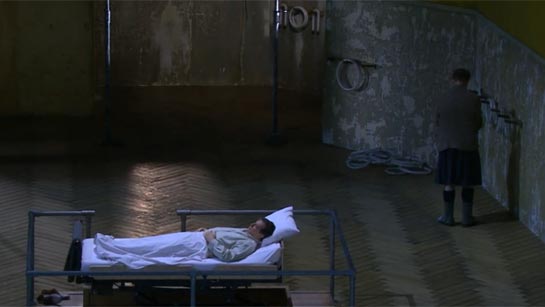
The tale of Tristan has been for me a long (and perhaps boring) tale of unconsummated love, with what may be opera's most frustrating operatic coitus interruptus occurring in the second act after which the betrayed king goes on and on about his disappointment. (Perhaps he should simply have anticipated Hans Sachs who nips any advances to him by Eva in the bud with a reminder of what happened to Isolde and King Marke!) For me the opera is first and foremost the music and Isolde's Liebestod at the end was the worthy culmination of the opera that evening and of the trip to Bayreuth as a whole. Tristan was sung by Robert Dean Smith, Isolde was sung by Iréne Theorin, Kurwenal was sung by Jukka Rasilainen, Brangäne was sung by Michelle Breedt, King Marke was sung by Robert Hall. Peter Schneider conducted.
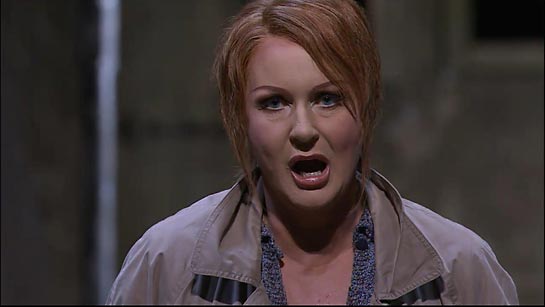
Irene Theorin: Isolde's Liebestod
I took a train to Nuremberg the next day, spent an afternoon on a walking tour of the city, and visiting the Dürer Haus. He had secretly built what was described in the English notes as a "cabinet" in the kitchen which was actually a toilet and was against the building codes. He was fined. The town records indicated that the officials recognized him as worthy man who had brought honor and wealth to the city but who could, nevertheless, not be treated differently from other residents. However, because of his stature, it was declared that, as soon as he paid the fine, it would be restored to him.
Colin Bayliss • Clemens Bieber • Bea and Alec Bobotek • Stephen Charitan • Gary Campbell • Jerry Floyd • Sam Goodyear • Janette Griffiths • Diana Herbst • Hildegaard Arnold Kiel • Randall G. Malmstrom • Anne Midgette • Walter Meyer • Wouter de Moor • John F. Runciman • Per-Erik Skramstad • Brian Slater • Julia Thornton • Natalie Tsang • Mark Twain •
Wouter de Moor in Bayreuth
![]()
What can you say more about a sunset besides that it is beautiful? You can play a piece of music while watching. Perhaps it becomes even more beautiful. Perhaps it changes the way you’ve looked at it before.
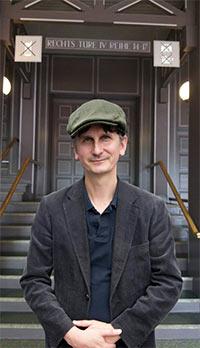
It was movie soundtracks that brought me into contact with the music of Richard Wagner. It was music that was connected with the soundtracks of Star Wars and Apocalypse Now. It was “The Lord of The Rings” in an opera. It was the first classical music that I could feel. Could feel like I felt the blues-based pop and rock music I grew up with. It did not manage to do so by the bombast it is very often associated with but by means of subtlety and musical richness. With dialogues set on music that liberated the opera from its typical classical arias and supplied me with an answer to the question why one rather would sing than talk in a theater play. Singing gave the words more meaning. Singing made you connect with the persons and their motives more.
In trying to find the best version of Wagner’s “Ring des Nibelungen” a fascination (by times obsession) was born. How could there be so much difference between all those recordings? Wasn’t the score the same for all orchestras and conductors? My search resulted in 15 different complete Ring cycles. From Bayreuth (Clemens Krauss from 1953 became my favorite) to the studio (Solti is the most famous one here but I never liked his Ring, I prefer Janowski from 1982). A decade ago, there was little else I was listening to. After the symphonic rock from the 80s, the funk rock, heavy metal and grunge from the 90s I had found a new musical love.
This year this fascination brought me to Bayreuth. From the moment Wagner’s Unendliche Melodie got me hooked this trip to the Festspielhaus was inevitable. And the attendance of Lohengrin on August 9 was the pinnacle of that trip. The music of Richard Wagner might have come to me as a superior kind of film music for Germans it’s more than just a soundtrack and a bunch of good tunes. Bismarck made Germany into one nation, Wagner provided the people in that nation a mirror in which they could recognize their own being, see their own soul. That may sound like melancholy in overdrive and pompous but in Germany culture is a serious matter. This kind of contemplations can be found in programs that accompany the performance of a Wagner opera. Art is not just there for entertainment purposes. It must be able to answer life’s questions. Art as therapy. You can not take this light hearted. It’s the opposite of Oscar Wilde’s “Life is far too important to be taken seriously”. Wagner, his ideas about theater, his legacy. They are like a rock that still lies in the landscape of German culture. He can’t be denied. And although Wagner and Nazism are separated by time, he was a source of inspiration for national-socialism. It causes unease until this day. A memorial site for Jewish musicians who worked in Bayreuth from the 1880s till the 1930s is erected in Bayreuth. Plates, placed like tomb stones in a graveyard, tell their story. Sad stories in which Cosima (Wagner’s widow) plays a highly questionable role. After Germany’s defeat in WW1 nationalism deteriorates into national-socialism and fascism and Bayreuth becomes a magnet for ultra-right-wing visitors (among them Adolf Hitler). If there is a direct line that connects Wagner (who died in 1883) with Hitler, that line is Cosima (who died in 1930). That gives directors and artists that want to stage a Wagner opera in Germany, especially in Bayreuth, an extra responsibility. Their intentions have to be above any moral doubt. In Amsterdam (where we are totally spoiled with high-quality Wagner performances) and the United States the situation is less complicated. For Wagner in naturalistic scenery you better try your luck in America where a helmet is still a helmet and a spear still a spear. In the US performances like this year’s Lohengrin, with rats instead of soldiers in the choir, are called Eurotrash.
Another place where they learned Wagner’s lesson about music and drama well is Hollywood. No movie soundtrack is without debt to the sorcerer of Bayreuth who, had he be granted another life as composer, would spend his days writing film scores in Beverly Hills.I arrived the day before the performance in Bayreuth. That gave me the opportunity to visit the Franz Liszt museum and Wagner’s grave at Wahnfried. In the Franz Liszt museum, the house where Liszt stayed and died during his visit to the Festspiele in 1886, is the piano on which Wagner composed Parsifal. Standing there I hesitate. Music notes come to mind: F, B, D#, G#. The Tristan chord. Would I dare to play it here? Like a try-before-you-die? I let the moment pass and don’t. Guess I have to save that one for the next time. Visiting Bayreuth is having an appointment with history. With all I have read about Liszt and Wagner and all the music I’ve heard from them the place provides me with a very rich experience. I feel like a kid in a candy store.
The next day is Festspielhaus-day and there are butterflies in my belly. I am that kid again that went, back in 1988, to a concert of his teenage idols: symphonic rock band Rush. I am ready to enter Walhalla.
The performance of Lohengrin is impressive. After attending a few less than successful stagings in the past (Peter Konwitschny’s Salomé and Martin Kusej’s Fliegende Holländer to name a couple of them) I had my doubts about Regietheater but Hans Neuenfels staging made a good case for it. The staging and Personenregie, as far away from a Teutonic calling for arms as you can imagine, worked well. The added extra layers, with rats in the choir and rats in a video (showing three possible storylines of what might have really happened), are not always understood by me but at least they don’t take anything away from the main storyline. Even better, it shows me that a modern, avant-garde production can be both thought-provoking and highly entertaining. In the Festspielhaus there is no climate control so by the end of the second act I’m in for some high quality Bikram opera.
In Wagner’s ideas for theater words are as important as music. The orchestra is placed under the stage so the singers are unlikely to get drowned by the sound of the instruments. As for that sound, the famous acoustics in the Festspielhaus, it means that the brass, placed in the back of the pit, has to play their guts out. Sometimes beyond salvation. Concerning the singers: Klaus Florian Vogt is perhaps the best Lohengrin at this moment. He is fabulous. The public reaction is euphoric. Clapping and shouting in a 20-minute long ovation after the final curtain. “That was like a football match”, I tell the man next to me on the way out. “Yes”, he replies, “ and Klaus Florian is Messi”.
Colin Bayliss • Clemens Bieber • Bea and Alec Bobotek • Stephen Charitan • Gary Campbell • Jerry Floyd • Sam Goodyear • Janette Griffiths • Diana Herbst • Hildegaard Arnold Kiel • Randall G. Malmstrom • Anne Midgette • Walter Meyer • Wouter de Moor • John F. Runciman • Per-Erik Skramstad • Brian Slater • Julia Thornton • Natalie Tsang • Mark Twain •
We recommend
Bayreuth Productions
Ring Productions at the Bayreuth Festival
The Bayreuth Festival, 2016
![]()
Das Rheingold (Castorf / Janowski), Bayreuth Festival, 2016
Die Walküre (Castorf / Janowski), Bayreuth Festival, 2016
Siegfried (Castorf / Janowski), Bayreuth Festival, 2016
Götterdämmerung (Castorf / Janowski), Bayreuth Festival, 2016
Tristan und Isolde (K. Wagner / Thielemann), Bayreuth Festival, 2016
Parsifal (Laufenberg / Haenchen), Bayreuth Festival, 2016

